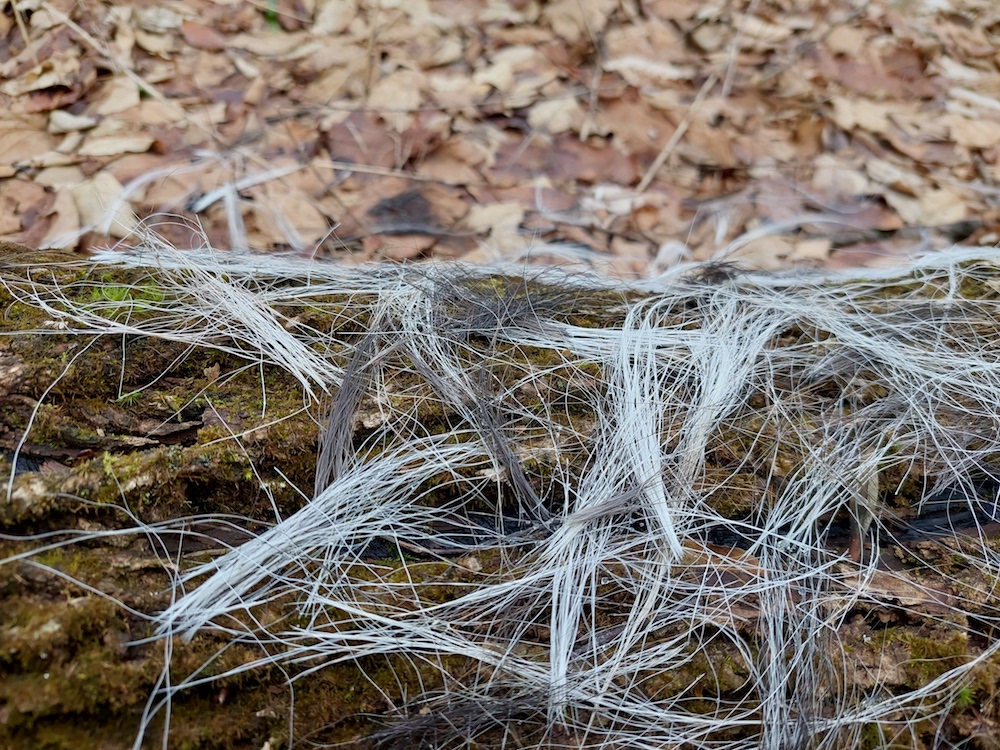Collections:
- All
- Deer
- Forestry BMPs
- Invasive Plant Control
- NYC Watershed
- Recreation and Wellness
- Safety
- Seasonal Blogs - Fall
- Seasonal Blogs - Spring
- Seasonal Blogs - Summer
- Seasonal Blogs - Winter
- Technology
- The Big Decisions
- Timber Stand Improvement
- Top 10
- Tree Planting
- WAC Forestry Research
- Wildlife Improvement
- Wood Products

Bio Blitz at Tilly Foster Farm
Have you ever done a scavenger hunt where anything you can find is on the list?
Read More
Rotting Spruce Log Leaves Behind Thin Strips Of Wood
I was doing some deer scouting in early October and I found myself on the edge of a Norway spruce stand. I was following a deer trail and slipping through the dead branches in the understory, when I noticed a spruce log decaying on the forest floor. There were wafer-thin wood strips laying around the log. I had never seen this before.
Read More
Installing Open-top Box Culverts at Clearpool Model Forest
In this blog, we describe the process for building and installing a water control structure called an open-top box culvert on forest roads at Clearpool Model Forest.
Read More
Skunk Cabbage Monitoring with Queens College
Volunteers up and down the Hudson Valley are on the hunt for a smelly sign of spring.
Read More
Possible Lingering Ash Tree Found at Frost Valley Model Forest
We think we found a lingering ash tree at Frost Valley Model Forest.
Read More
Marking Trees to Harvest at Lennox Model Forest
In this blog, I share what I learned about tree marking for a timber harvest on Lennox Model Forest.
Read More
Harvest Planning to Protect Water Quality and Citizen Science Research
This blog discusses several harvest planning considerations at Lennox Model Forest, including water quality, forestry research, interpretative signage, and BMP demonstrations.
Read More
Planning for a Timber Harvest at Lennox Model Forest
This blog documents how the idea for a timber harvest at Lennox Model Forest came to be and how forest measurements informed which trees would be marked for harvesting.
Read More
Giant Ichneumon Wasp
What’s that long tail on that wasp? Is it really boring into that tree’s bark? Why’s it doing that?
Read More
Miyawaki Mini Woods
Do you know a vacant lot in your city, town or village or even in the countryside? Would you like to see a mini woods take it over? Here is a method that Akira Miyawaki developed in the nineteen-seventies to establish woods that reach maturity in a shorter period of time than naturally. How does it work?
Read More
Trees that control wildfires?
You hear about the wildfires raging through the west burning thousands of acres. Spending thousands of dollars on thinning overgrown stands can help control wildfires. What if we had another tool? Some people have speculated aspens slow wildfires. A study based on twenty years of research in the southwestern US now verifies that speculation. It shows that the more aspen you have the slower the fire spreads.
Read More
WFIT - Where Educators and Environmental Science Meet
Five days, one watershed, over two dozen inspired educators. WFIT 2025 brought together teachers from across the NYC Watershed to explore water, forests, and community while rekindling the joy of learning outdoors.
Read More
City Trees Bring Big Benefits
Have you ever stood on a city street corner in the summer with the sun blazing down and sweat dripping down your face and back as you waited for the light to change? I am a shade seeker on those days.
Read More
Garlic Mustard - Invasive Villain or Naturalized Neighbor?
Is garlic mustard the menace we think it is, or have we been pulling the wrong plant all along? A new perspective suggests we might be fighting the symptom, not the cause.
Read More
Trying my Hand at Nature Photography
Are you tired of taking blurry wildlife photos? You know, the ones where you have to explain what’s in the photo to your friends and family. “I promise, that’s a bald eagle.” Hopefully this blog helps you out.
Read More
How Properly Installed Culverts Protect Watersheds and Forest Ecosystems
How often do you stop to notice, or even think about, a culvert? In this week’s blog, we take a deeper dive into a simple infrastructure tool that is helping keep forests healthy and watersheds free from unwanted runoff.
Read More
Old Growth Forest
Does old growth still exist? Yes, but in very limited supply. It comprises less than one percent of woods in the Northeast U.S. In New England, it comprises less than one tenth of a percent. In New York it is roughly one percent of the Adirondack Park and three and one half percent of the Catskill Park.
Read More
Heavy Harvests and Abundant Wildlife on a Western Massachusetts Fire Tower Hike
In June 2025, Jess and I hiked to the Shelburne Falls, Massachusetts Fire Tower on Massamet Mountain (elevation 1591 feet). We started at the Mass Audubon High Ledges Sanctuary trailhead off Patten Road. We followed Sanctuary Road west to Ridge Trail, which heads south to a service road that takes you to the fire tower. The one-way distance is about a mile of moderately difficult hiking.
Read More
We Replaced the Decking on Our 50-Ft Bridge
On Friday, May 16, 2025, the WAC Forestry Program hosted a pop-up logger training workshop at Cannonsville Lumber in Deposit, NY. The objective: replace the decking on the 50-foot bridge bound for Siuslaw Model Forest. 10 loggers attended, including 2 loggers from Cannonsville Lumber.
With thunderstorms forecasted for the afternoon, I was worried we might not get the job done in one day.
Read More
Your Woods–When Best to Manage?
Your woods can be made up of several stands, or trees of similar size/age and species mix. These stands can be managed as separate units.
Read More
Helpful Hints for Managing Your woods
Do you feel stuck when it comes to doing something in your woods? Don’t want to mess it up or get it wrong? Here are some pointers to help you out.
Read More
Woods: Leave Alone or Actively Manage?
What are some pros and cons of leaving a woods alone or actively managing it? Active management being where a landowner carries out activities to reach a desired goal. Let’s look at some examples of each. After checking those out you can decide what the pros and cons are.
Read More
Unusual Wood Products Part 3
Would you be surprised that a wood based material sucks up pollutants in the air? Technology is allowing more and more ways to utilize wood in different products. Let’s look at some different products made from wood that didn’t exist ten years ago.
Read More
Unusual Wood Products Part 2
Would you be surprised that some home insulation now comes from wood? Technology is allowing more and more ways to utilize wood in different products. Let’s look at some different products made from wood that didn’t exist ten years ago.
Read More
Unusual Wood Products Part 1
Would you be surprised that some shoes now contain wood? Technology is allowing more and more ways to utilize wood in different products. Let’s look at some different products made from wood that didn’t exist ten years ago.
Read More
Forester, Logger, Arborist…Which One Do I Want, and How Do I Find Them?
Arborists specialize in individual tree care, often in urban or suburban settings. Foresters use tree measurements, landowner goals, and knowledge of forests to develop plans to care for your woods over time. And loggers are the boots on the ground carrying out the plan you and your forester developed.
Read More
Scruffy Whitetails (Who's Scruffy Looking?)
At first I was excited to get some good deer photos. But when I looked closer, my excitement turned to concern. What was wrong with these deer?
Read More
Stewardship Story: Invasive Vine Removal at Otter Creek Preserve
Westchester Land Trust’s Otter Creek Preserve was overrun by invasive vines that threatened interior woods habitat. They solved the problem with hand tools, volunteers, and a lot of elbow grease.
Read More
How to Convert Your Old Log Landing into a Wildlife Food Plot
Every timber harvest has an area where logs are sorted and then loaded onto trucks for delivery to a sawmill. These areas are called landings, and they are more impacted by logging than any other part of a harvest because of all the equipment driving around. Right after a harvest, a landing can look messy, with the plants worn away and bare dirt exposed. But these areas don’t have to stay messy.
Read More
How Far Can Deer Swim?
Ever wonder how far a deer can swim? Some people find them swimming out in large lakes or the ocean miles from land.
Read More
Clothes from Wood?
Would you ever have believed someone could make clothes from wood?
Read More
Best Chance to Avoid Ticks
You are playing soccer with your kids in the back yard when the ball bounces into the woods.
Read More
Silence: Don’t interrupt It
I opened the door to a white blanket of deep snow that lay on the tree limbs in my back yard and stretched across the lawn and over the neighboring house roofs. What hit me was the quiet! So still and noiseless in the white beauty. Ah, what peace. There was a sacredness I didn’t want to break with my voice. I whispered to my wife: “look at this.” And afterwards I thought no, “listen to this”. Listen to what? The stillness, the quiet. Yes, it drew me in.
Read More
Wooden Skis Again
To you downhill skiers out there! Now you can purchase a downhill ski in the wood ski tradition made with modern techniques and that performs with the best of skis made today.
Read More
Wind Turbines made from Wood?
Ever wonder what happens to those wind turbine blades when they reach the end of their roughly twenty-five year life span?
Read More
Drones Replant Forests?
Would you have ever believed that drones could plant tree seeds?
Read More
Epigaea repens: A Flower Worth Smelling
One early April day I was headed up the side of an old, vegetated gravel bank when a green leafed plant caught my eye. It was the hairy pale evergreen leaf that did it. I looked at Tracey behind me and asked, “Do you recognize this plant?”
Read More
Giving Urban Trees a Second Life
It’s no secret that access to natural spaces improves communities. There’s a mountain of anecdotal experiences and scientific studies that prove being around trees makes us feel good and makes our neighborhoods more desirable and sustainable.
Read More
Tax Tips for Woods Owners
Do you own woods? Have you had a harvest in your woods this past year? Do you know the tax code related to woods work?
Read More
Biophilia and Exposed Wood in Buildings
Alright, what is biophilia? “An innate instinct to connect with nature” as Erica Sweeney put it. Or Natalie Angier thinks of it as “to be drawn toward nature, to feel an affinity for it, a love, a craving.”
Read More
Mass Timber: Coming to a town near you?
Mass timber, also known as cross-laminated timber or CLT is becoming a mainstream building material. What is it? It is basically plywood on steroids.
Read More
It’s February, why haven’t these leaves fallen?
Have you ever noticed leaves hanging on to certain trees throughout the winter? This phenomenon is known as marcescence, and why it happens is still widely unknown, though scientists have theorized a variety of reasons. Typically, most deciduous trees drop their leaves during the fall season, however those who hang onto their leaves are marcescent.
Read More
Health Benefits of Interacting with Water
I was out on my noon time walk in the local preserve after a morning rain. As I walked, I heard something and paused to listen more intently. Ah there it was, the sound of the stream rushing over rocks as it tumbled out from the little valley up ahead. I was drawn to it.
Read More
Signs of Too Many Deer
This MyWoodlot blog was adapted from a National Deer Association article by Lindsay Thomas.
Hunting is the primary way that states attempt to control deer populations since many of the natural predators (like coyotes, wolves, and mountain lions) do not control the deer populations anymore.
Read More
A Critter and a Pine Woods
What’s with that pile of stripped pine cones? Was some sort of seed collecting machine set up there for a while? Well, yes actually.
Read More
Tale of the Albino Hawk: Part II
Back in 2016, WAC Watershed Forester Tom Foulkrod wrote a blog about a white raptor he saw near his home in Stamford, NY. I spotted a white red-tailed hawk in the same area during the 2022 hunting season and again in the summer of 2024. Could it be the same one Tom wrote about?
Read More
Spreading Slash for Seedlings
I have always heard that logging slash – tree tops, limbs, and branches – protects young seedlings against deer browse. After a tree service job at my house, I had a lot of tree branches to clean up. I decided to spread them out in my woods and set up a backyard experiment.
Read More
Invasive Plant Control at My House
Not sure how I missed it, but this summer I noticed some invasive multiflora rose growing rapidly in my front yard.
Read More
Spittlebugs 101
Spittlebugs, also known as froghoppers (Cercopoidea), get their names from the traits that they possess. Spittlebugs produce ‘spit’ by chewing on the leaves and stems of plants. They can also jump very high, which is where the name froghopper comes from.
Read More
Why Manicured Lawns Deter Wildlife and Impact Biodiversity
How much time and money do you spend mowing your lawn? Did you know that if you reduce your mowed lawn area you will notice an increase in biodiversity, decrease in pest species, and less overall lawn management?
Read More
The Nature Pyramid for Health
Want to keep healthy and enjoy the natural world? Try the 20-5-3 rule for health in the natural world. These are some fascinating new findings.

Artsy Plant Pests
Have you ever been out for a hike in the woods or a stroll through your garden and noticed a pattern on the leaves of plants that is out of the ordinary? Kind of like this leaf?
Read More
Building my First Holz Hausen
Are you looking for a wood stacking method that requires no materials other than firewood itself and can be built pretty much anywhere? I thought you were. Consider trying your hand at a holz hausen.
Read More
Late Frost Kills Oak Leaves
A late frost in 2023 killed many of the newly formed oak leaves in the Catskill Mountains.
Read More
Want More Wildlife? Start with More Caterpillars
Want more wildlife on your property? Then you may want to focus on adding native plants that support more caterpillars by using the Native Plant Finder tool.
Read More
Ash Salvage
A thorough look at a white ash and hemlock harvest on a property in the Catskill Mountains.
Read More
Tree and Shrub Planting at My House
In late-January 2023, I placed my first tree and shrub seedling order from the Delaware County Soil and Water Conservation District office. I ordered several fruit trees and then some hazelnut, elderberry, and cranberry seedlings that came in bundles of 10. This blog documents how my wife Jess and I planted and protected these mast-producing trees and shrubs in mid-April 2023.
Read More
Building Up the Woodpile for Next Year and Beyond
In early April, Kris Brown tries to get caught up on firewood for the next heating season and beyond.
Read More
Three Tricky Maples: Red, Norway, Sugar
MyWoodlot team member Tom Pavlesich has posted about his experience tapping the maple trees in his backyard and then using the sap to make maple syrup. If Tom’s posts have inspired you to tap some maples yourself, one of the first things you’ll need to know is how to identify different kinds of maple trees
Read More
Maintaining Young and Old Tree Planting Projects
Each year in early spring, the Watershed Agricultural Council (WAC) Forestry Program team maintains tree planting projects that are part of the Croton Watershed Trees for Tributaries Program, otherwise known as Trees for Tribs. This blog demonstrates the different types of maintenance activities we do depending on site conditions and the age of the plantings.
Read More
Biochar Benefits for Soils
In a past blog introducing biochar, I shared some of the broad benefits of biochar which can be made from tree and log residue as well as agricultural residue. There are so many benefits of biochar in the agricultural crop area, so I wanted to share those in more detail.
Read More
Beech Bark Disease in the Catskills
Over the last couple months I have been fortunate enough to be out in the Siuslaw Model Forest performing field work with other staff as we develop new agroforestry demonstration areas. As we were out working in a new site last week, I was intrigued by the severity of beech bark disease, known as BBD, we had seen on this hillside.
Read More
Trees Fusing Together
Have you ever come across two trees with their branches fused together?
Read More
Can Deer Freeze to Death?
Have you ever wondered, as you sit inside your warm house, when the temperature dips into the negative numbers, how do deer handle this kind of weather? Could they freeze to death?
Read More
Why Animals Gnaw Shed Antlers
Some folks enjoy searching for antlers in the late fall and early winter just after the deer have shed them. It can be hard to spot these antlers, let alone end up with a matching pair from a deer. Have you ever found an antler and realized as you looked at it there were gnaw marks up and down it?
Read More
Wind-Sculpted Snow
Once in a while the snow density and wind are just right to create interesting patterns in the snow.
Check out the patterns, as well as the mix of fence, fence posts and fall’s leftover plants in these photos.
Read More
How Do Small Birds Survive Frigid Winter Weather?
Ever wonder how small birds survive frigid winter nights or snow storms when the temperature dips down into the teens and below? Let’s look at the options these birds have to stay warm.
Read More
Cat Litter Made from Wood Pellets
You may be familiar with Karl VonBerg’s blog, “Link to Karl's Blog on Wood Does What?” about the many uses for wood products. Our three cats use an amazing wood product every day, 3-4 times a day. I’m talking about wood pellet cat litter.
Read More
What to do with Wood Ash?
When I started heating with a wood stove a few years ago, I didn’t know what to do with the leftover ash and charcoal. My primary goal was to find a safe place to dump it without causing a brush fire. With some experience, I developed some higher goals for my ash disposal. This blog covers some beneficial uses for wood ash around the house.
Read More
My Favorite Firewood Species and Why
For the last two heating seasons, I have used a cordwood burning fireplace insert to heat our house. While I’m not a veteran wood stove user, I have tended enough fires to develop some preferences in the wood I burn. This blog lists my favorite firewood species and why.
Read More
Trees Fight Microplastics
Why are we addressing microplastics on MyWoodlot? Read on to discover how sawdust and other components of wood/plants can address the microplastics problem.
What are microplastics? They are little pieces of plastic that measure less than 5 mm (1/5”).
Read More
Check Out that Firewood Stack
On my daily commute I drive past a house with a unique firewood stack. It’s a large, uncovered pile shaped like a razorback mountain ridge. For months I rubber-necked at the pile and wondered about things like how long it takes before the wood is seasoned, as well as the logistics of bringing loads of firewood inside the house. One day, I stopped in to get the scoop from the landowner.
Read More
Forest Farming Across New York State
Forest Farming is the most common form of agroforestry for landowners in New York State. Landowners cite ecological stability in addition to financial incentives as motivation to implement systems, with shiitake mushrooms, maple syrup, and ginseng turning the greatest profits.
Read More
Agroforestry: People, Profit, and Environment
This blog defines agroforestry and the five recognized agroforestry practices. A survey of 300 landowners across New York State revealed that forest farming, alley cropping, and windbreaks are the most common practices implemented.
Read More
Identifying Deer Pressure
How can you tell if deer are overpopulated in your woods?
Read More
Coyote Close Encounter
In late August, on my way back from walking a bit of the rail trail that parallels the West Branch of the Delaware River, I had an encounter with a coyote.
Read More
Summer Foraging Adventures in the Catskills
For me, one of life’s simple pleasures is to get multiple things done at the same time. Multitasking or killing two birds with one stone, so to speak. It’s one of the reasons I like foraging so much. You get a multitude of benefits from traipsing through the great outdoors (for example, fresh air, exercise, and clarity of mind), plus tasty food from the forest that helps to keep the grocery bill down.
Read More
Ash tree growth at Lennox Model Forest: 2021-2023
Each year after trees have fully leafed out, I help to collect data for a citizen science project called MaMA (Monitoring and Managing Ash). Data collection involves assessing ash tree health and looking for definite signs of the Emerald Ash Borer (EAB), an invasive insect pest that kills ash trees. Fortunately, after 6 years of monitoring, there is still no sign of EAB at Lennox Model Forest in Delhi, NY. I wondered how much these trees had grown during this period.
Read More
It’s Tabling Season for MyWoodlot.com
Attending forestry related events and farmers markets is one of the ways that we market MyWoodlot.com to family forest owners in the NYC Watershed. It is a great way to meet landowners and learn about their interests, concerns, and objectives for their woods. This blog highlights our tabling event schedule for summer and fall 2023.
Read More
Repairing the 50-ft bridge at Frost Valley YMCA
Maintaining forest roads and trails is important to provide reliable access to the woods for management, recreation, research and education. Frost Valley YMCA’s 50-foot bridge over the West Branch of the Neversink River is the gateway to their 300+ acre Model Forest. The bridge’s white oak decking had over 20 years of service, but by the spring of 2023 it was due for replacement.
Read More
Wood-Based Sinks, Toilets and Bath Tubs
What if you could buy a sink made out of wood chips? One that didn’t need to be protected with a special waterproof coat. But could sit in water for months and have no issues with it functioning well. Even if it was chipped or broken.
Read More
THE MOSQUITOES ARE COMING!
Mosquito bites don’t make us appreciate mosquitoes. Around the world they are the most deadly animal. However, they have some interesting and good qualities.
Read More
Hay-scented Fern - A Control Freak of Nature
Have you ever walked through a forested area, seen a patch of fern, and thought, “That is really beautiful”?
Read More
A Compost Post - Part 2: How to Compost in All Spaces on All Budgets
Welcome back to Part 2 of “A Compost Blog Post: How to Compost in All Spaces on All Budgets! Learn how to turn your household and landscape waste into organic fertilizer with four more composting methods.
Read More
A Compost Post - Part 1: How to Compost in All Spaces on All Budgets
Standing in front of my compost tumbler on my parent’s half acre of property, I balance a large pot of kitchen scraps: seeded cores from peppers, ends of carrots, wilted spinach picked out of a bag of greens, and spoiled counter tomatoes. Setting the pot on the supporting ground, I slide open the two doors on the tumbler’s chambers. Peeking down into the dark basin of the tumbler, I observe the compost’s natural aerobic (oxygen-required) processes as the earthworms and microorganisms break down the waste generated from our household.
Read More
Continuous Improvement with Chainsaw Safety
This blog documents a novice chainsaw operator’s progress towards tree felling competency. A chainsaw safety training program called Game of Logging provided the building blocks.
Read More
How Trees Become the Products You Use
Have you ever wondered how products from trees make it to the local lumber yard or your doorstep? Here is a wood supply chain that shows the steps with some explanation about each step.
Read More
Conservation Dog Blog
Dogs have long been prized for their incredible sense of smell, and in the last few decades we’ve really begun to test the boundaries of their noses. It turns out dogs can sniff out all sorts of stuff; game animals, people, illegal substances, even cancer cells. The world of detection dogs is always expanding, and recent additions to this impressive group of pups includes the conservation dogs at the New York-New Jersey Trail Conference.
Read More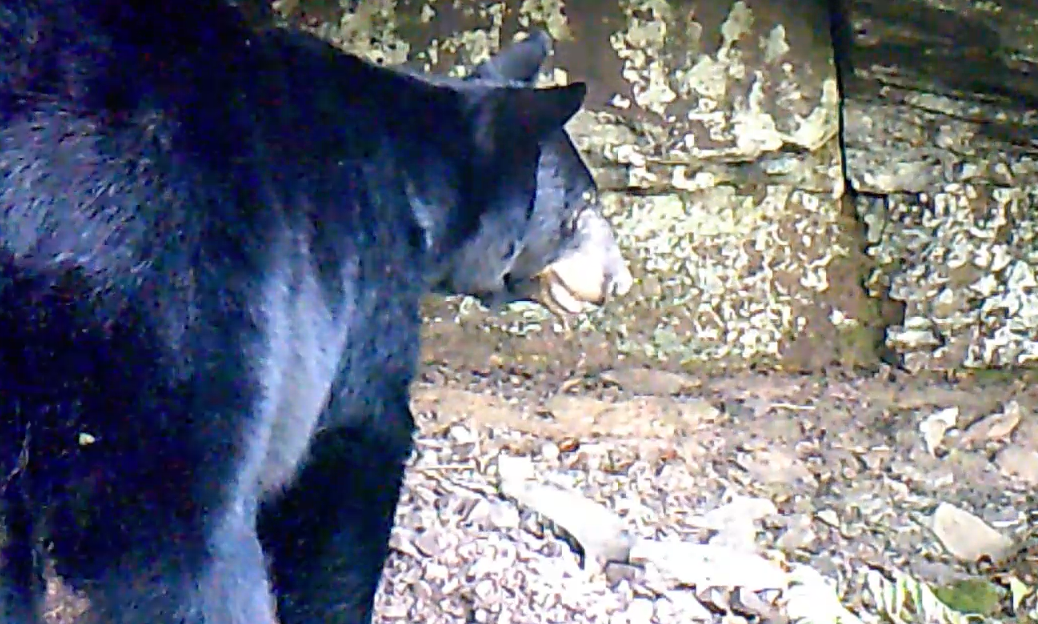
The Spring Emergence of the American Black Bear
As spring begins with snowmelt, and color comes back to the landscape, wildlife become increasingly active. One to note is the American Black Bear (Ursus americanus). Depending on weather conditions, the black bear emerges from its den around late March – early April.
Read More
What is That Coyote Digging Up?
Have you ever come across places in the woods, fields, and brush where coyotes have been digging? Do you ever get curious enough to check out what they are digging up? The other day I got curious and had quite a surprise.
Read More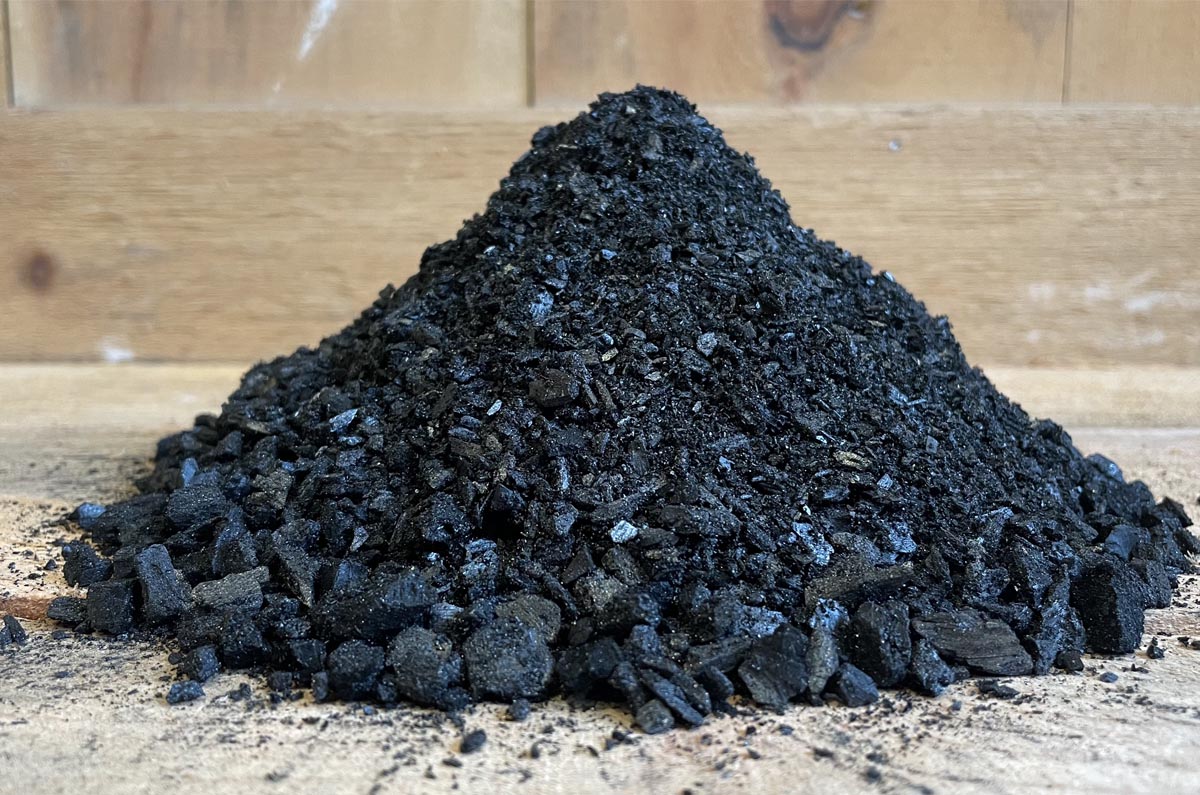
Biochar
Would you ever think that something that leaves a sooty mess on your hands could have so many benefits? Biochar is a form of charcoal that increases crop production, filters water, reduces smells, insulates homes, improves health and much more.
Read More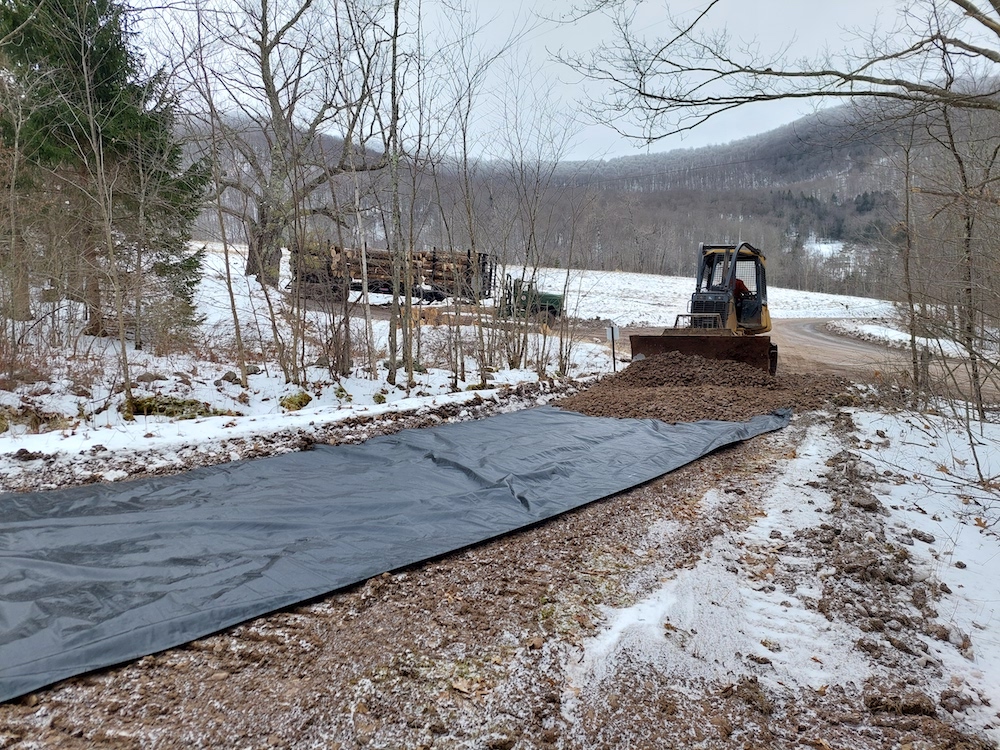
Estimating Forestry BMP Installation Time and Cost
The water bar is perhaps the most well-known forestry best management practice (BMP) used to protect water quality during a timber harvest. Water bars have an important job, and that is to mitigate erosion of forest roads and trails by reducing surface runoff volume and velocity. Despite the water bar’s relative fame, the cost to install one is somewhat of a mystery.
Read More
Troubles Gone with the Wind
Have you ever stood at the top of a hill, on a mountain, at the edge of a gorge, by a waterfall, by the ocean or a lake and felt the wind blowing over your body?
Read More
Woods Wash Water
Mother Nature takes issue with the idea that NYC’s drinking water is unfiltered.
Read More
Visualizing Climate Change Impacts in My Woodlot
I was inspired by a new climate change activity on MyWoodlot called See How My Woods will Change. Specifically, there is a tree flagging exercise that helps to highlight trees species with Poor, Fair, and Good capabilities to cope with climate change impacts in the Northeast.
Read More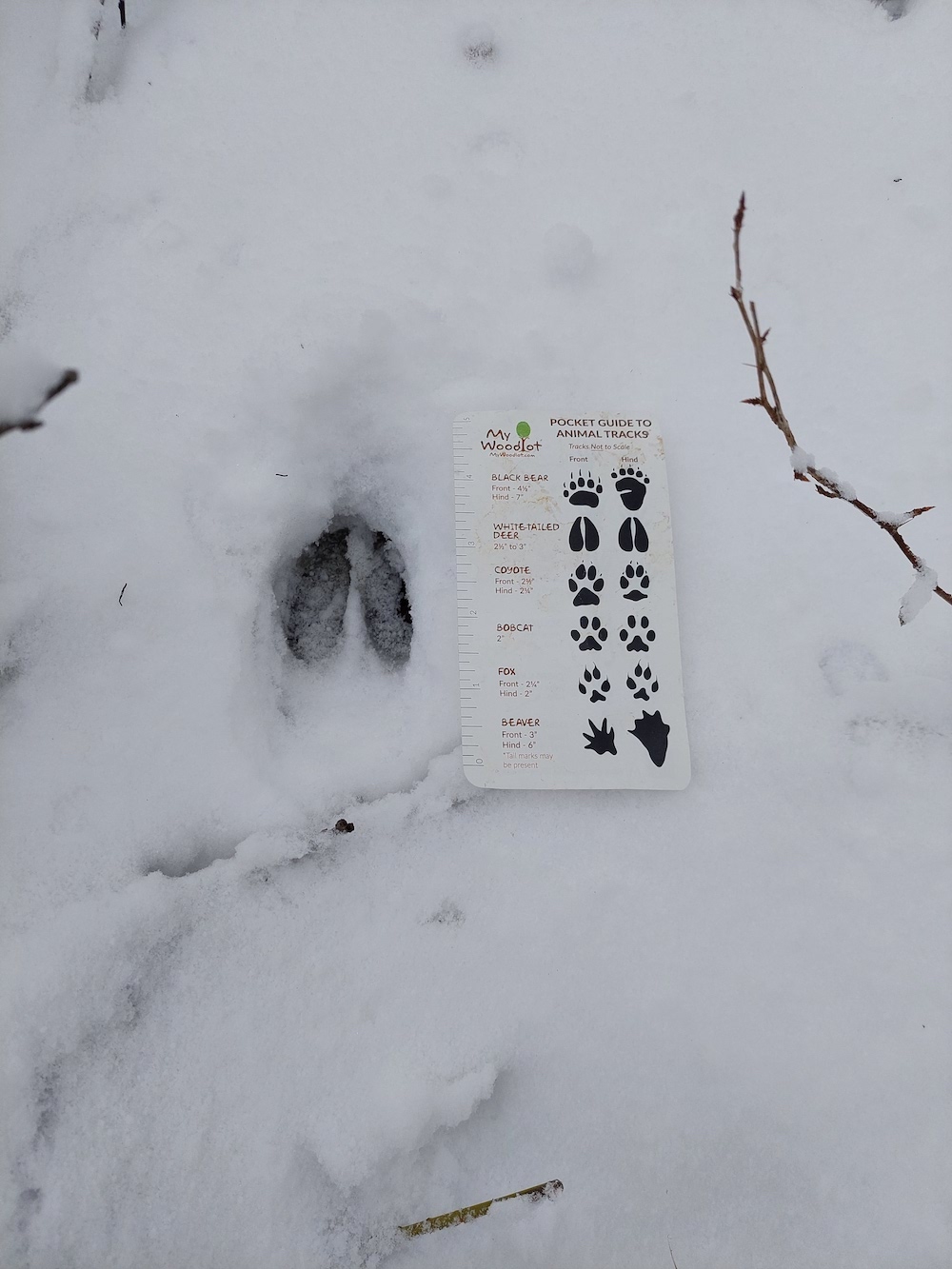
Identifying Wildlife Tracks in the Snow
It was January 24, 2023, just a few days after a snowstorm had dumped 8-12 inches over much of Delaware County, NY. The conditions were perfect for a post-lunch snow walk in the Nature Conservancy’s West Branch Preserve.
Read More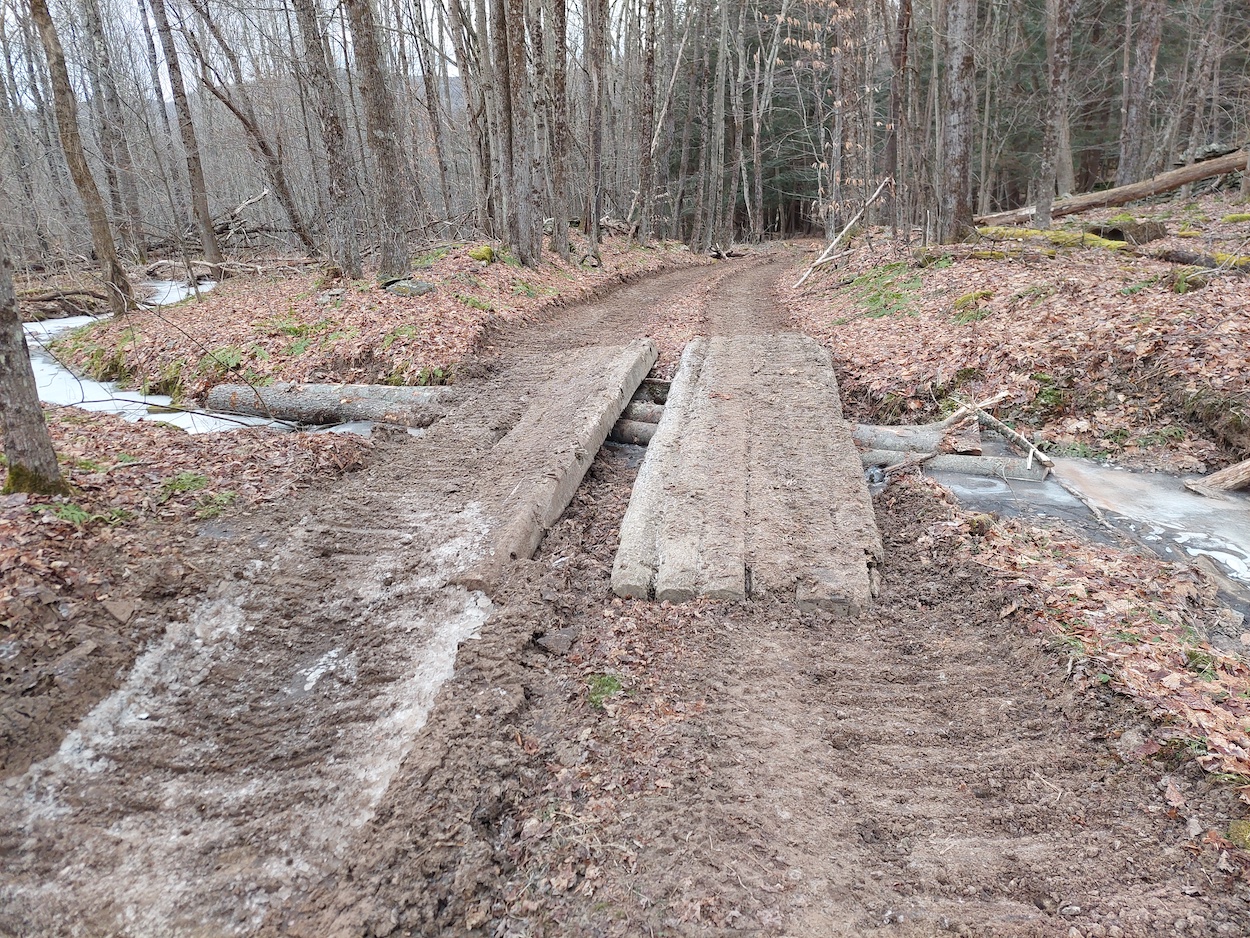
Pre-Harvest BMP Installation Protects Water and Improves Logging Efficiency
Do you know a forestry best management practice (BMP) when you see one? This blog is a continuation of a previous one about a cut-to-length logging operation in Catskills.
Read More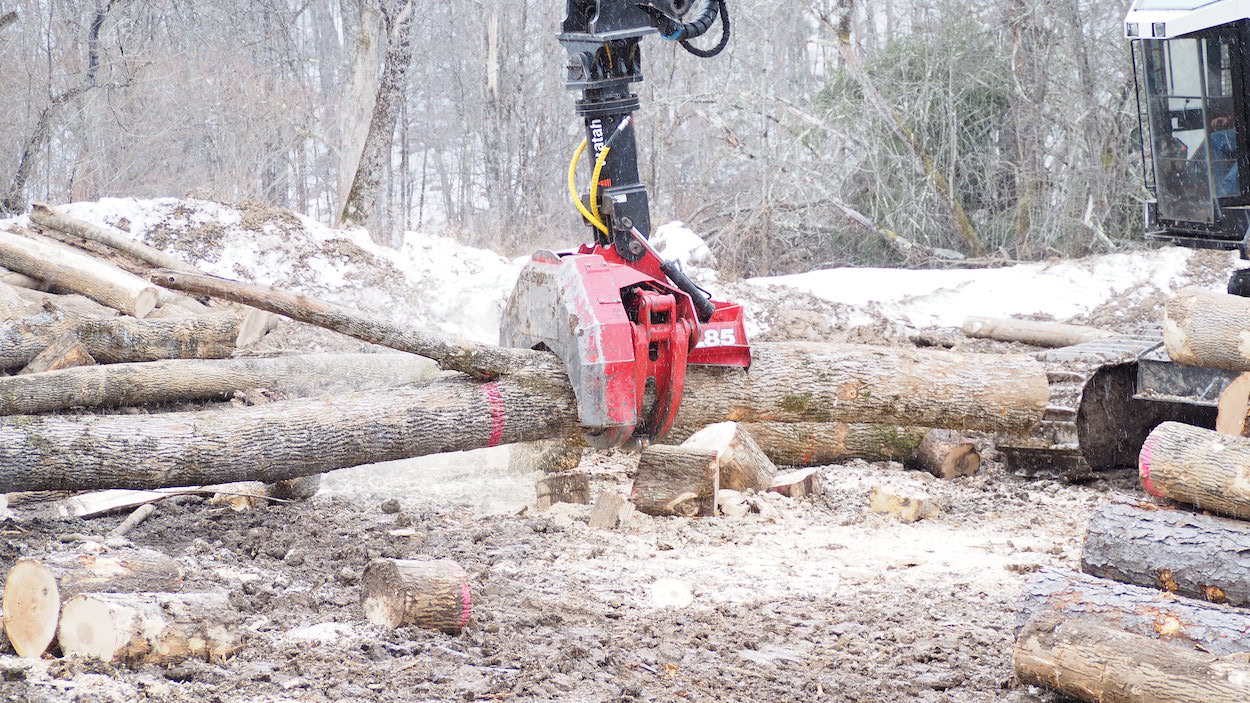
Cut-To-Length Logging on a Catskills Woodlot
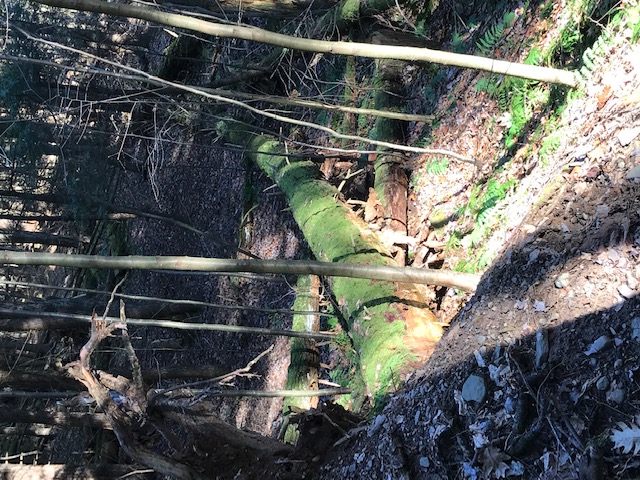
Repurposing Trees, Nature’s Way
Have you ever thought about what this world would be like if nothing died and rotted away?
Think about it. Trees and bushes would just keep growing, and if a windstorm blew them down they would just lay there year after year, century after century, piling up higher and higher. How would you deal with that?
Read More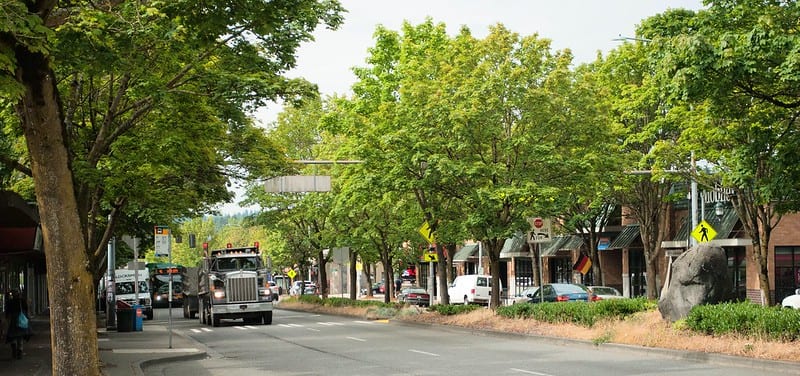
Urban Trees Make You Healthier
I am guessing most of you prefer the one with trees as opposed to the one without trees. Did you know that urban trees improve our health?
The facts are in. Researchers have shown that peoples’ health improves when trees exist where they work and live.

Wood Batteries
As the world has become more electrified the need for better battery technology has become more evident. Batteries aren’t that efficient and their production/disposal is not environmentally-friendly.
Read More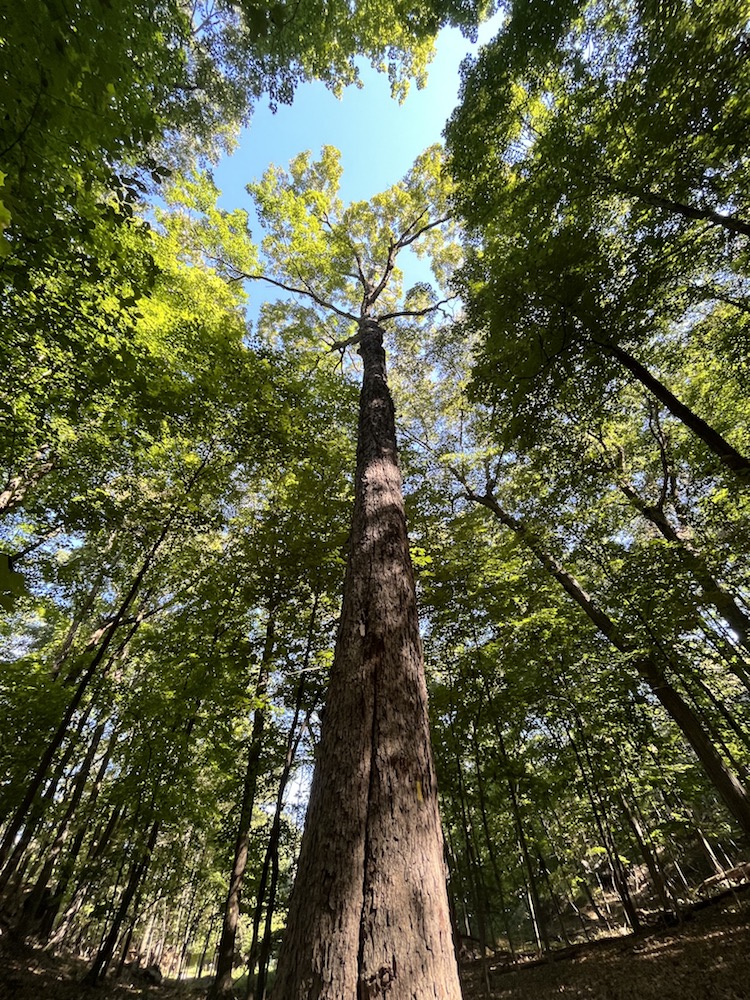
Chasing the Light
Trees, like all plants, need light to survive. The need for light is so strong that it shapes trees, forcing branches and trunks to grow in sometimes odd directions as the leaves reach for the sun. When out in the woods, you may notice some of these differences in growth patterns, which can tell a story about the trees that took root there.
Read More
The Fibonacci Sequence and the Golden Spiral
There are things in the natural world that defy randomness.
The Fibonacci sequence is one of them:
1, 1, 2, 3, 5, 8, 13, 21 . . . Can you see the pattern and figure out the next number?
Read More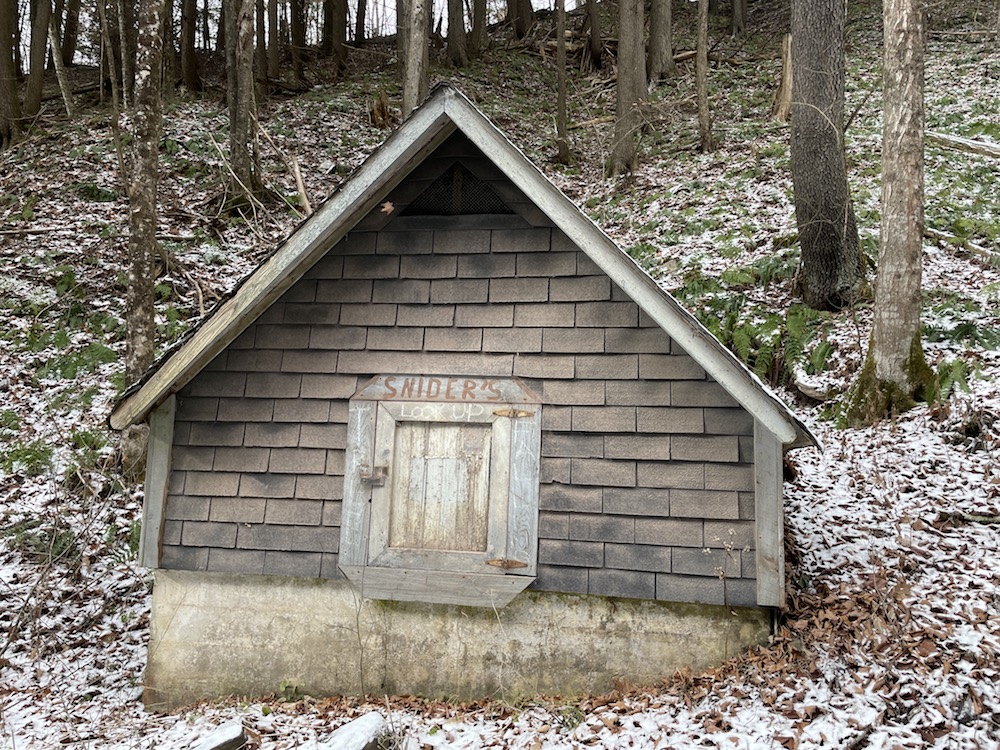
Spring Houses
Because the water comes from underground it stays at roughly 50 degrees Fahrenheit year-round. Before modern refrigeration, the presence of a good spring on one’s property was far more convenient and practical than the use of ice houses.
Read More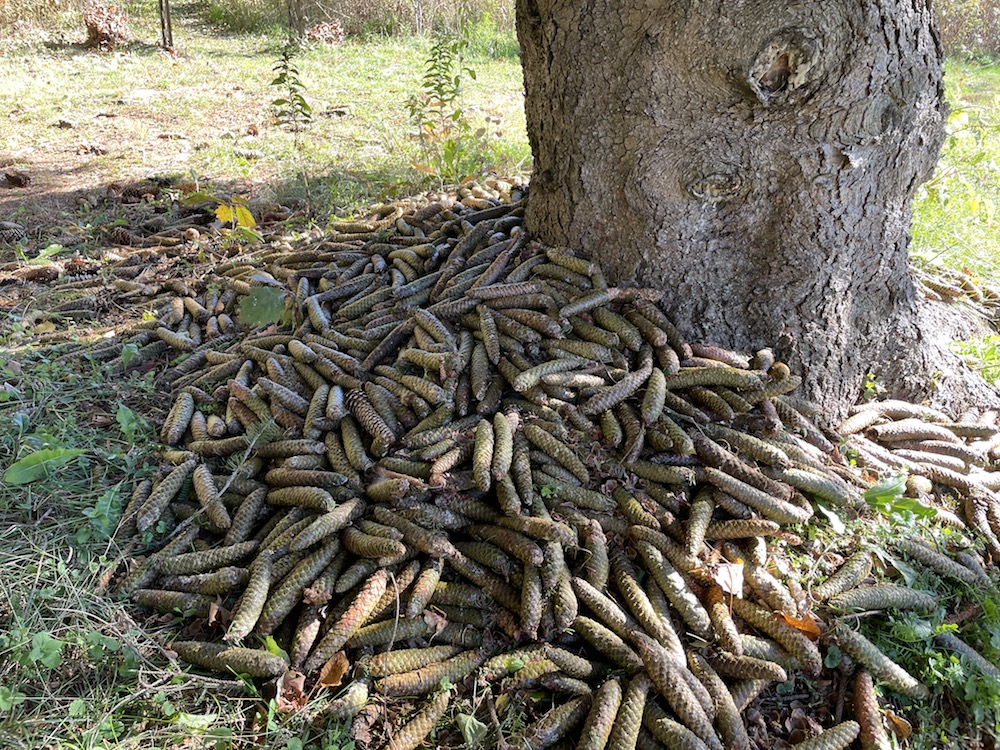
Freddy’s Cache
Why the name Freddy? Richard Proenneke was a self-educated naturalist/conservationist/wildlife photographer who kept daily journals during his nearly 30 years spent in an isolated cabin in the Alaskan wilderness. He referred to all red squirrels as “Freddy.” Since I have thoroughly enjoyed all of his journals, so do I.
Read More
Cutting Firewood in My 2-Acre Woodlot
In a previous blog, I shared about a recent wood stove purchase and learning to heat my house with firewood. I bought the first several cords of cut, split, and delivered firewood for $250-$300/cord.
Read More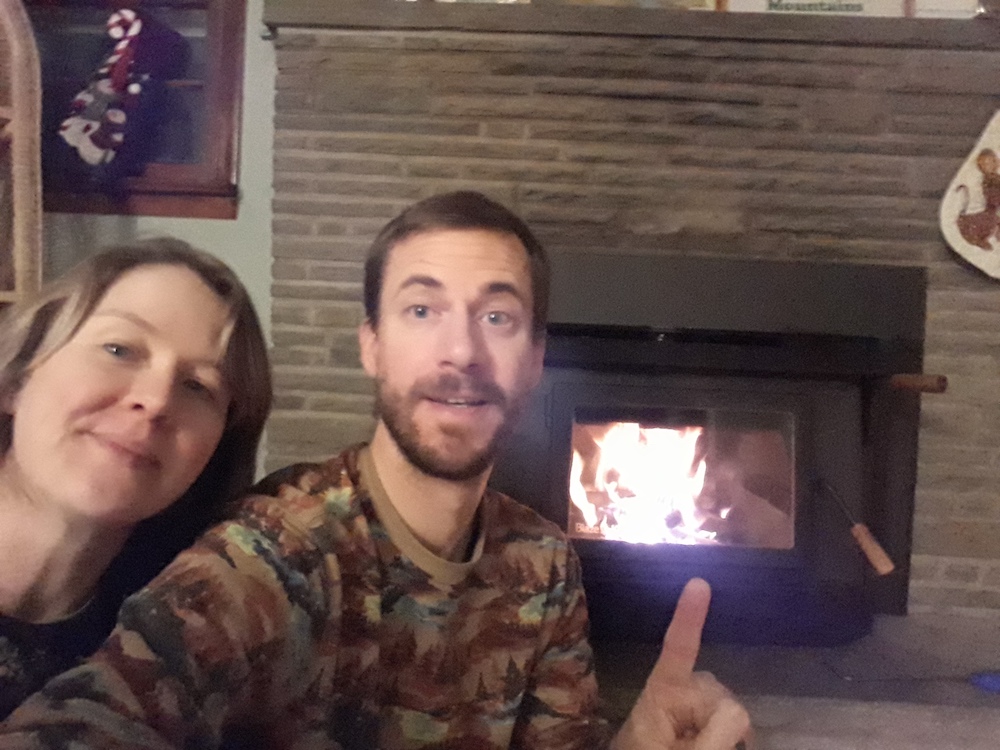
Learning to Heat Our Home with Firewood
My wife Jess and I moved into our Stamford, NY home during the last weekend of January 2021. Temperatures were in the teens and there was knee-deep snow on the ground. That sounds tougher than it was. We were tickled to be homeowners and when we weren’t moving furniture, the oil-fired, water-filled baseboard heating system kept us warm.
Read More
Frost Awe
Are you pining for a warm summer morning, sipping your beverage of choice on the porch while the warmth of the day comfortably envelopes you?
Read More
Maintaining Forestry BMPs is Good for You and Water Quality
Water bars, rolling dips, broad-based dips, and open-top culverts are examples of water diversion devices (WDDs) used on forest roads and trails. Their primary purpose is to control the volume and velocity of road surface runoff, thus preventing erosion.
Read More
How Leaves Keep Paying it Forward
Leaves are part of an amazingly fine-tuned cycle, the nutrient cycle. Let’s take a look at how this cycle works in the woods:
Read More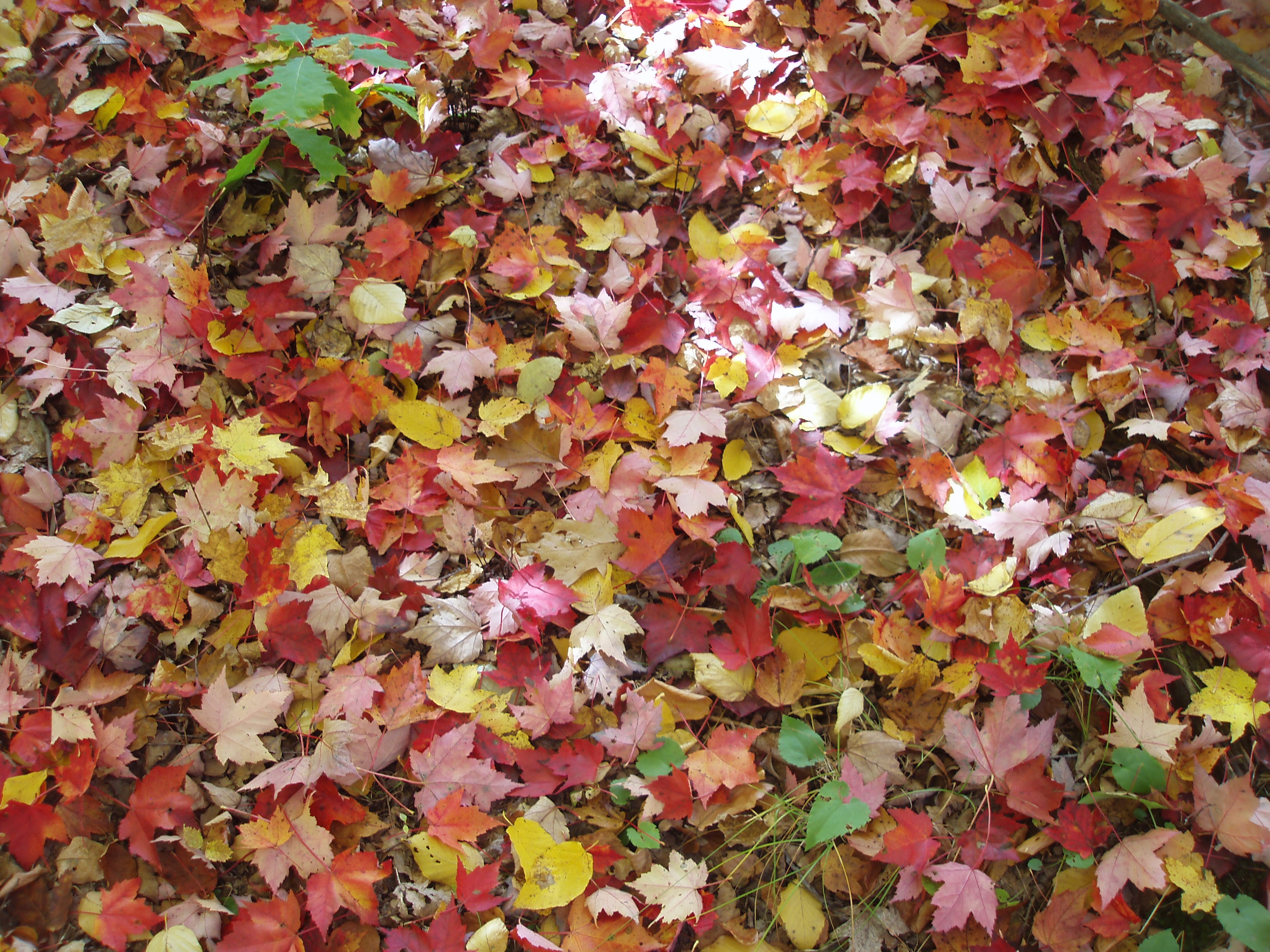
Pesky fall leaves are good?
Leaves, leaves everywhere! It is that time of year when the newly fallen leaves pile up on your lawn and in your woods.
Read More
Nature Heals so Use It!
My mom used to say: “Get out and get some fresh air.” She would basically kick me out of the house. I never thought about it at the time, but she knew something about the natural world that we are realizing more and more.
Read More
I Spy a Big White Bird in a Tree
Have you ever been driving and something catches your attention? Something that you can’t quite make sense of, so you stop to investigate?
Read More
Late Fall Flowers
Late fall may seem like a drab, brown season, but there are lots of interesting sights to find if you look closely.
Read More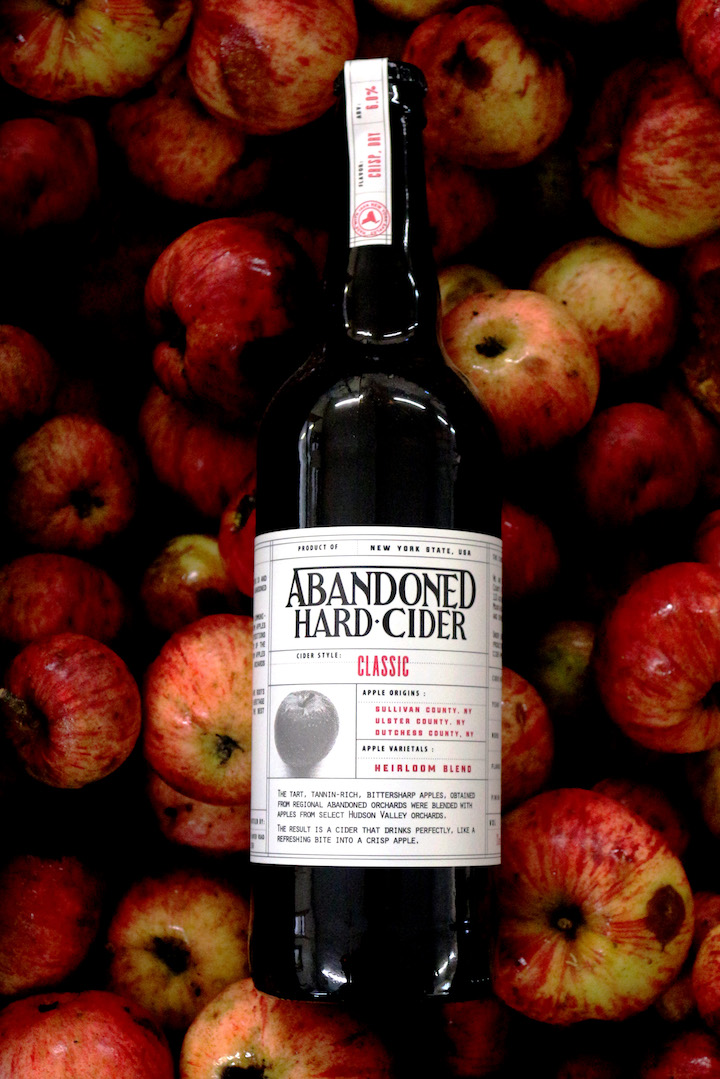
Crowd-sourcing Wild Apples for Cider
“We’re always looking for more wild apples,” explains Martin Bernstein, co-founder of Abandoned Cider, a hard cider company based in New York’s Hudson Valley that incorporates apples from wild trees into many of their cider products.
Read More
Do Trees Scream When Insects Invade?
Did you know that trees in a woods can communicate with each other and the animals in the woods? They send out information when they are getting attacked. Information that helps others come to their rescue. Check out how this works.
Read More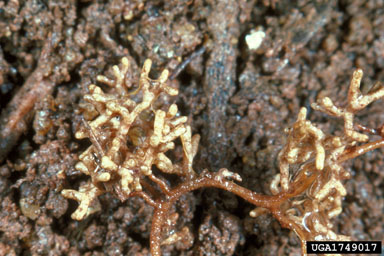
Why Trees Thrive: Mycorrhizal Fungi
Fungi may conjure rotten thoughts. But fungi can be very helpful. Check out how mycorrhizal fungi help trees grow and stay healthy.
Read More
The benefits of AWE!
Have you ever stared in wonder at a sunset in all its brilliant colors? Or had your jaw drop at an incredible move by an athlete? Or heard a song that gives you goosebumps? YOU ARE BEING AWED!
The Greater Good Science Center at UC Berkeley studies this phenomenon and they discovered that being awed makes you healthier and makes you feel more connected to others.
Read More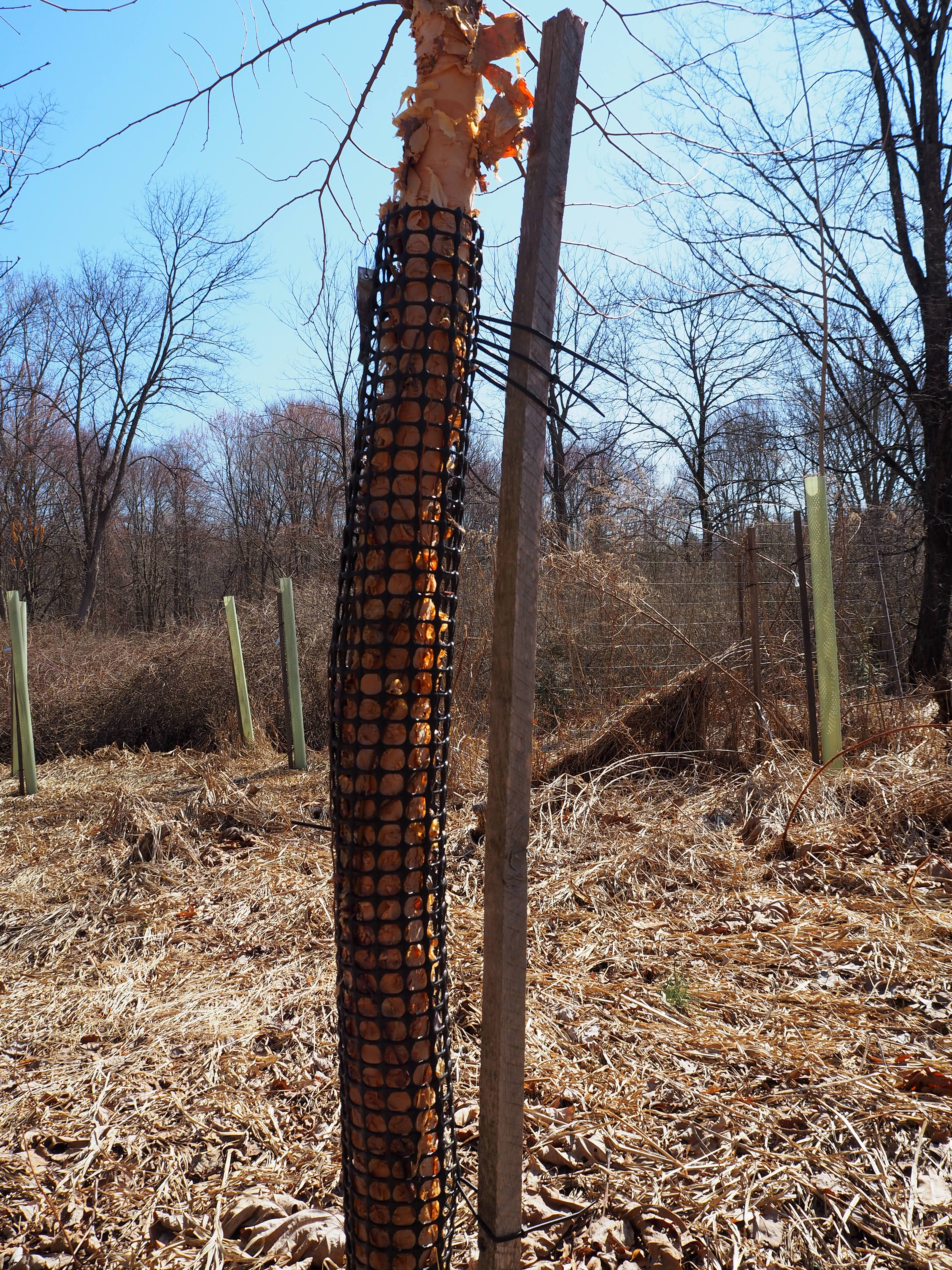
Protect Young Trees from Deer: A Smorgasbord of Options
What can landowners do to protect young trees from deer? This blog provides a range of deer exclosure options and cost-share opportunities for family forest owners.
Read More
Relive: A Social Route-Mapping App for Outdoor Adventurers with a Fun Video Element
I recently discovered a fun smartphone app called Relive that uses GPS to track your hike/run/bike and other outdoor activities. You might be thinking, “So what? Many hiking apps already do that”.
Read More
How Many Snags Should My Woods Have for Wildlife?
You might think dead trees in your woods mean something is wrong. But death is part of the woods, and dead trees, called snags, are important for a host of wildlife.
Read More
Creating Your Own Smartphone Map
Creating your own georeferenced .pdf map allows you to customize a map of your property to use on your smartphone.
Read More
Mapping My Woodlot with my Smartphone
Smartphone mapping apps are an easy way to become more familiar with your woodlot.
Read More
Raising a Monarch(y) Part Two
About 24 hours after I collected my monarch eggs I had three teeny tiny wiggles to feed and look out for.
Read More
Raising a Monarch(y)
Summer in the northeast is transformative. The earth seems to come alive again; trees are green, flowers are blooming, and monarchs have arrived.
Read More
Ten Projects You Can Do on Your Land This Earth Day
April 22nd is Earth Day, and woodland owners are in a better position than most to make a difference. Here are ten projects you can do this Earth Day (or just about any day) to give back to nature.
Read More
Bleeding for Blackberries
A heavy timber harvest leads to scratches, stains, and engorging of blackberries.
Read More
Reality of Roots
Have you ever heard that trees are like an iceberg, mostly hidden from sight?
Read More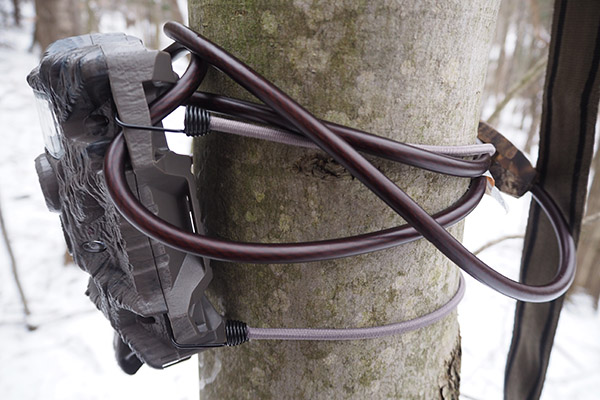
5 Lessons I Learned About Trail Cameras
I started using trail cameras in 2019 to scout for deer and to capture photos of other Catskill Mountain wildlife I might not easily see on woods walks. I did my homework before I got started, but sometimes the best way is to learn by doing. Hopefully some of these takeaways will help you out.
Read More
B&B Forest Products Ltd. Builds a Skidder Bridge for Siuslaw Model Forest
At a skidder bridge building workshop a few years back, several loggers had innovative ideas to improve the bottleneck of drilling holes in the bridge cants. However, no one suggested getting a bigger drill.
Read More
A Clear-Cut Controversy
If a tree falls down in a forest, does it ever grow back?
Read More
Forensics in the Forest
Are your woods hiding any spooky secrets?
New research suggests that it is possible to use forest chemistry to locate missing human remains. However, more research needs to be done for this to be applied practically.

Beech Beauty
The major leaf fall has occurred in the Catskills and the landscape has turned drab brown. But wait! There is still vibrant color out there.
Read More
I Stepped Inside a Fairy Ring and Lived
It was 6:00 AM on October 3rd. I had just turned off my headlamp after getting situated in my climbing treestand. Everything was dark except for some white splotches on the ground beneath me.
Read More
Forests and Bird Migration
In New York, migrating birds can be seen flying south in fall on their way to wintering grounds in the southern United States, Central and South America. Birds migrate to fulfill two primary resource needs – food and nesting locations. In fall, available insects and other food sources decrease, so some birds migrate to areas with higher amounts of food resources.
Read More
Scouting Land for Trees for Tribs
What makes a good tree planting site and how do I qualify for Croton Trees for Tribs?
Read More
Logging, what goes on?
Guest author Jack Van Buren has a road-side chat with a logger to learn more about what loggers do for a living and what goes on during a timber harvest.
Read More
Portable Bridges? What? Why?
A sharp-eyed commuter notices a new bridge over a stream on her way to work. She stops to find out what’s happening in the woods in the middle of winter.
Read More
Wood: Tough as nails?
Have you seen the not-so-obvious things that are made from wood? Well, now here is another one: wooden nails, along with some other interesting items.
Read More
Stay on the Trail: Scouting the Winter Woods for Wildlife
Winter is a great time of year to scout for wildlife sign, or to simply take a nature walk. The leaf-off season means you can see long distances in the woods and snow-covered ground serves as a short-term record of wildlife using the area.
Read More
Portable Skidder Bridge Installation at Siuslaw Model Forest
Skidder bridge replacement job done at Siuslaw Model Forest. Thank you B&B Forest Products Ltd. of Cairo, NY!
Read More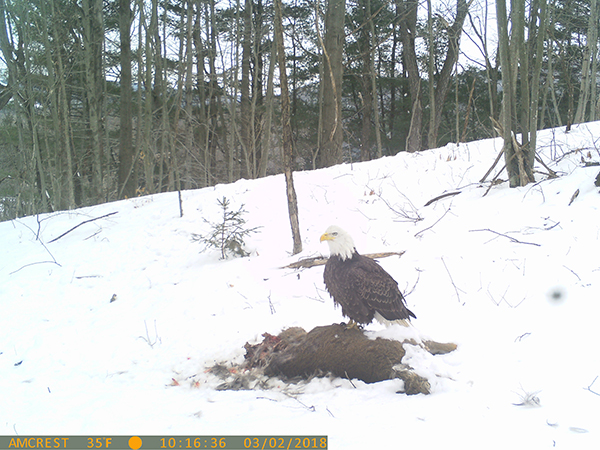
Backyard Scavenger Research: Part I
I was lucky enough to get a deer during the 2021 early bow season in the Catskills. After processing it in the garage, I had about 40 lbs. of venison, 25 of which would become deer burger.I debated about what to do with the remaining deer carcass. Then I remembered some amazing bald eagle photos that MyWoodlot team member Tom Pavlesich captured by placing roadkill deer in front of his backyard trail camera.
Read More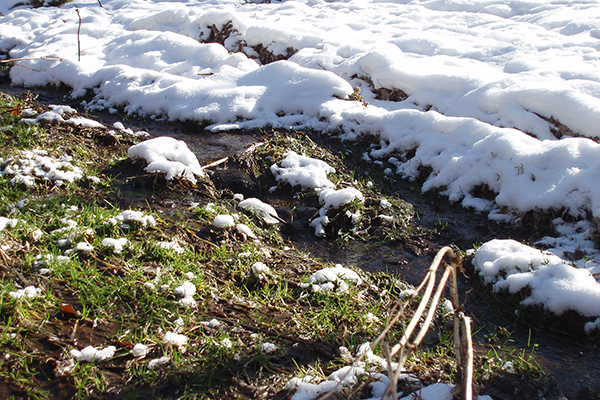
Seeps in the Snow
If you wander your woods on a snowy day, you might come across an area of surprising green, like the one in the photo below. These areas are called seeps, and if you’re fortunate enough to have one, you have an excellent winter home for wildlife on your hands.
Read More
Look-Alike Leaves: Red, White, and Scotch Pines
It’s a cold January morning, and leaves are a distant memory. Or are they? Just because the cold has made the hardwood leaves drop (and larch needles, our only deciduous conifers!) doesn’t mean we can’t sharpen our tree ID skills. Winter is a great time to focus on evergreens like pines, hemlocks, spruces, and cedars.
Read More
EAB in Arkville NY (Central Catskills)
Another day, another emerald ash borer (EAB) discovery. That seems to be the way things are going lately. On October 28, logger Jake Rosa was harvesting a woodlot southeast of the Dry Brook Ridge near Arkville, NY in the central Catskills. It was a sunny, cool fall day. Jake was cutting some ash trees when he noticed a lot of woodpecker peck holes (small foraging holes) in the top of one of the trees he had cut down.
Read More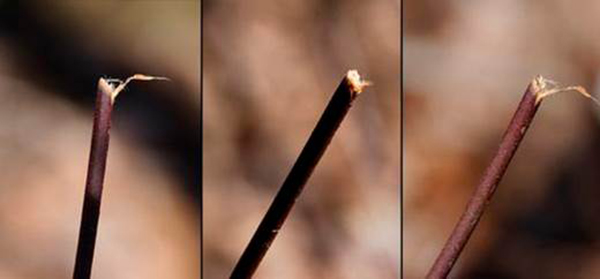
Dinner for Deer
My family always eats a big meal around Christmas, and this year, that got me thinking. What do deer eat this time of year? During the spring and late summer they feast on new growth – leaves, grasses, and herbaceous plants (like spring wildflowers). In the late summer and fall they shift to fruits, nuts, acorns, and farm crops.
Read More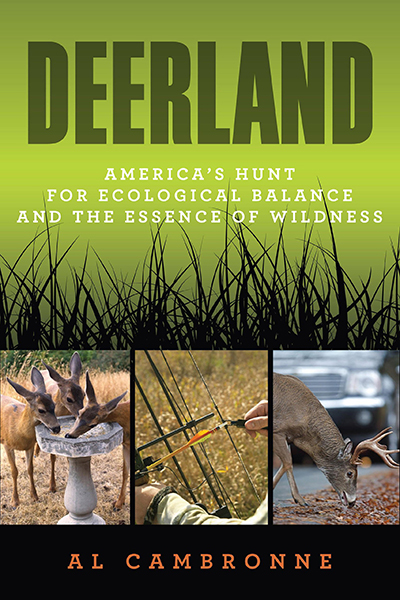
Book Review: Deerland by Al Cambronne
Few woods-related topics are as important – and as emotional – as white-tailed deer. In his 2013 book Deerland: America’s Hunt for Ecological Balance and the Essence of Wildness, Al Cambronne delivers a thorough, well-researched, rational discussion of this often irrational topic.
Read More
Passionate Pine Protector - The Red Squirrel
The sound keeps going, and I realize it’s coming from a white pine tree in front of me. I look up, and as I do the chirp suddenly accelerates into a sharp, staccato burst. It’s like no bird call I’ve ever heard.
Read More
Lichen: Bold Colonizer
On a nice late fall day I wandered back to one of my favorite spots in a local nature preserve. As I sat looking out over the valley where only the oaks still held their leaves, I noticed the carpet of reindeer lichen and moss around me.
Read More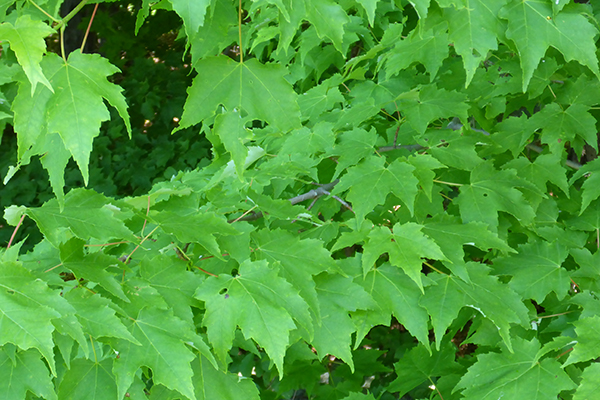
Roots, Stems, Branches, and Leaves…Oh-my!
If you take the time to learn the root, stem, branch, and leaf traits of different trees, you’ll gain a whole new perspective when you’re in the woods.
Read More
Acorn Bombs Away!
For weeks now, the pin oaks on my block in Queens have been bombarding passers-by with fertile missiles. Neighbors compete for the few parking spaces outside the strike zone, hoping to avoid a dented hood … or head.
Read More
Culvert, 1, 2, 3's
Culverts are popular choices for roads, trails, and driveways in the woods. If you ever foresee installing a culvert in your woodlot, keep the following three tips in mind.
Read More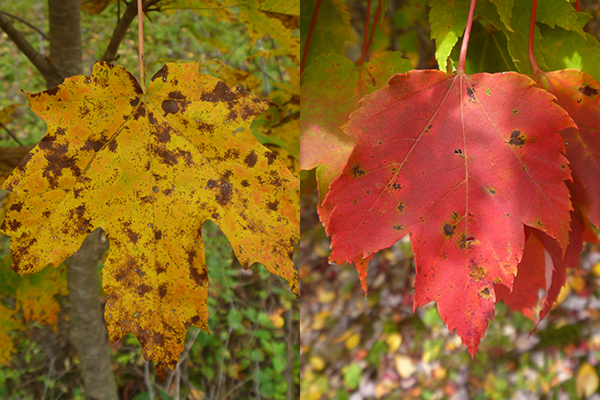
Fall Colors Part 2: Why Do Leaves Change Color in the Fall?
In my last post, I talked about why leaves change color in the fall. But as I wandered my local woods this October, another question came to me. Why do different trees turn different colors?
Read More
Fall Colors Part 1: Why Do Leaves Change Color in the Fall?
Fall may just be my favorite season. I’m not a fan of what follows it, but for those precious few weeks in September and October, fall is an amazing time to be in the woods.
Read More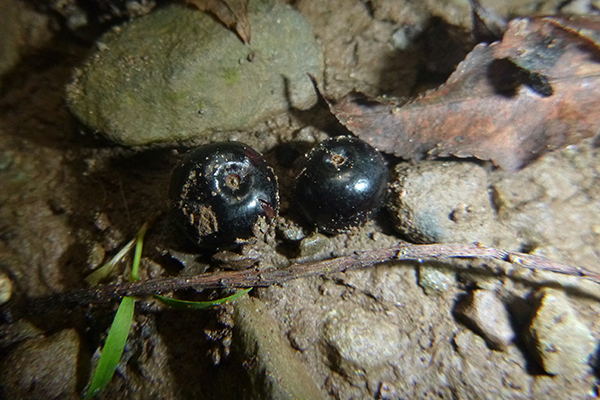
Woodland Edible: Black Cherries
When summer turns to fall, keep an eye on the ground underneath your black cherry trees. Why? Because this time of year black cherries are ripe, delicious, and ready to eat.
Read More
What Draws Us to Water?
This question has been on my mind lately, ever since my recent early morning visit to Bear Spring Mountain Wildlife Management Area in Walton, New York.
Read More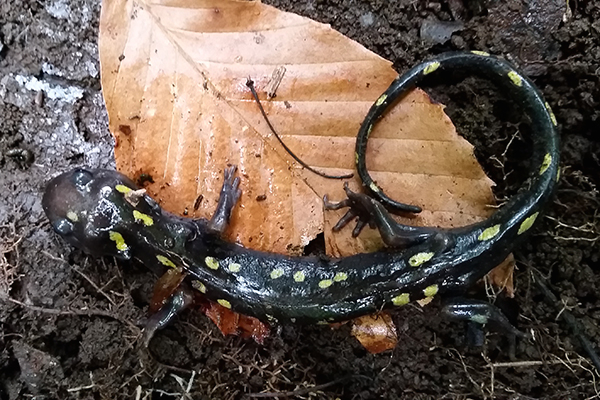
A Vernal Pool and a Spotted Salalmander
I step out of a patch of beech brush onto an over-gown dirt road marked by the subtle wheel ruts of old farm traffic. A flash of white on the ground catches my eye as I chart a course between the ruts.
Read More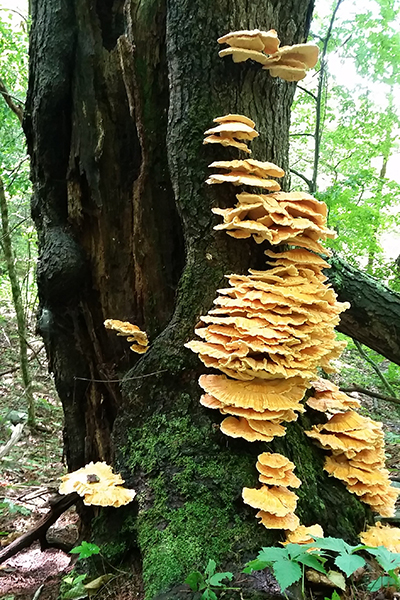
Hiking Before Lunch
On a muggy July morning—the kind where your clothes feel like they’re glued to your skin—I’m out hiking through a deep hemlock grove on the West Branch Nature Preserve.
I don’t have a specific destination in mind. I just want to explore, to see what catches my attention.
Read More
Rock Pile Mystery
On a recent woods walk I found something I’d never seen before: half a dozen mounds of stacked stones. Each pile was about 3 to 4 feet high, and they varied from 6 to 15 feet wide.
Read More
Backyard Monarchs
This summer to fall, Stefni Krutz captured the transformation of monarch caterpillars into butterflies in her backyard.
Read More
Take a 4-minute Nature Vacation Blog
College students are wrapping up for summer, parents are signing up the kids for camp, and it seems like every other week another coworker is flying off on some exotic seaside getaway. But what about you?! You’re in need of some time off, too, but you just don’t have a week to spare. Well, do you have 4 minutes? You do? Great. That’s all you need.
Read More
Online Scouting and Map Making with MyWoodlot’s Watershed Mapping Tool
Learn how to create a georeferenced PDF map of your NYC Watershed property, or one of the many NYC Watershed Recreation lands, in just three steps.
Read More
2021 Ash Mortality Monitoring at Siuslaw Model Forest
In 2018, which was Year 1 of ash mortality monitoring at Siuslaw Model Forest, 15 of the 42 trees we assessed had succumbed to the emerald ash borer. As I planned to return to help with Year 4 data collection, I thought we’d have a short field day because all the ash would be dead.
Read More
Psychotic (in a Good Way) Wildlife Benefiting Behavior
You know you’re in for an adventure when the first thing a landowner says to you is, “So have you heard about my psychotic deer behavior?”
Read More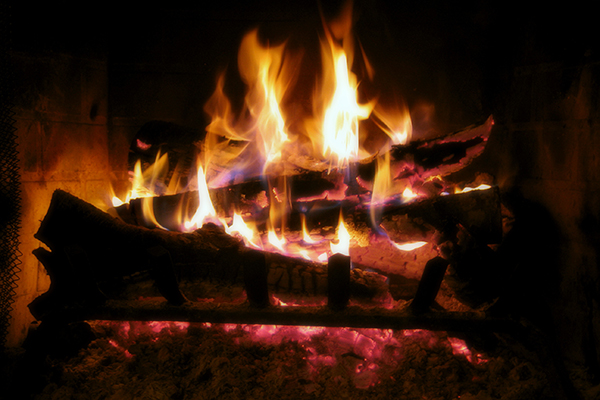
A Thanksgiving Break
Warning! It’s the week of Thanksgiving, which means I’m feeling sentimental. By the time you read this, it’s likely I’ll be at home with my extended family.
Read More
A Frosty Photo Shoot
Winter and I do not agree. But even I have to admit there’s some beauty in the cold, as I discovered one morning when hoarfrost coated the woods.
Read More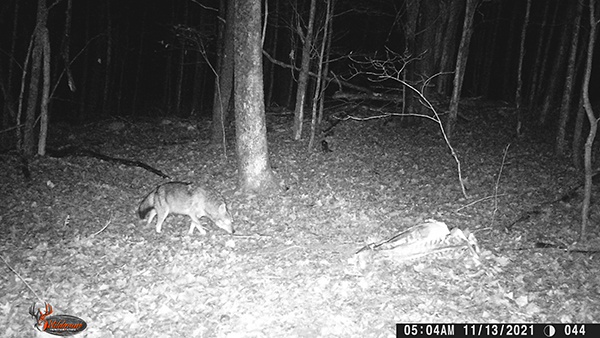
Backyard Scavenger Research: Part 2
Last week, I shared how I placed a deer hide (from a deer I processed) in front of a trail camera to capture photos of scavenging wildlife. This week’s blog shows what happened after I put out the rest of the carcass.
Read More
"Wild" Apple Trees
When you look at your woods, you might think they’re a wild place, but there are marks of people’s influence all over them. Some are obvious, like cabins and trails. But others are so subtle, you might not even realize that they have a human history.
Read More
Remarkable Wildlife Videos Taken with a Trail Camera
Is it possible to be awesome at trail camera photography or videography? I mean, the camera does all the work, right? MyWoodlot guest-author Matt Smetana proves it’s all about camera placement.
Read More
Find Your Own Berry Picking Patch This Summer
This summer, I found a berry patch loaded with blackberries and blueberries and I had it all to myself. Use this blog to help you know when and where to look for your own wild berries in the Catskills.
Read More
Fuzzy Egg Mass on an Oak Tree’s Bark
Can you name the exotic insect pest responsible for this egg mass? The egg mass was found in August 2020 on the bark of a red oak tree in Albany County, NY.
Read More
Smartphone Birding with the Merlin App
When I come across an unfamiliar bird I usually rely heavily on field guides and the knowledge of others to help me learn which species I’m looking at. I didn’t have any field guides or ornithologist friends with me on this walk, so instead I pulled out my phone and opened my Merlin Bird ID app.
Read More
Profitability of Logging in the NYC Watershed
In 2018, researchers at SUNY-ESF published a paper about the profitability of timber harvesting, from a logger’s perspective, in the NYC Watershed and surrounding areas (link to article). The study examined 23 logging jobs and found that almost half were losing money.
Read More
Assessing Deer Browsing Impacts at Lennox Model Forest
Cornell Cooperative Extension developed a method called Assessing Vegetation Impacts from Deer (AVID) that anyone can use to assess deer browsing impacts in their area. Annual measurements of seedling heights are the basis for quantifying the impact of deer browse. Over time, this data can help to inform management decisions to reduce deer browsing impacts so that desirable tree species may grow.
Read More
Snags Loom Over the Garage
While standing dead trees (aka snags) provide wildlife habitat, you don’t want them hanging over your house. Follow along as I begin the planning process to bring them down.
Read More
Why High Lumber Prices?
Why is that lumber for my DIY project or new home costing 3x what it did last year at this time?
Read More
The Early Spring Things You See in the Woods
Who doesn’t get excited for spring, especially in the northeast United States? When I finally emerged from winter torpor, I started hiking in the woods like it was my job. Along the way, I came across several signs of spring.
Read More
Caddisfly Larvae, Small Critters With Big Abilities: Stabilizing Streams
Would you ever guess a one-inch, worm-like larva could slow erosion in a stream?
Read More
The Trees for Tribs Story at Sylvan Glen
Yorktown’s popular Sylvan Glen Park Preserve has a rich land use history that has shifted from mining to hiking trails, but one thing that has remained constant through the years is the need for a strong riparian zone.
Read More
Planting by Water
When Lake Waccabuc needed help fighting erosion and runoff, the Three Lakes Council turned to trees to save the day.
Read More
Who Drank that Water and Where in the World Did it Come From?
Who else might have drunk the water you drank today? Where in the world did it came from? South Africa? Hong Kong?
Read More
Woods Fight Coronavirus
A compound found in the boreal woods of Finland is being developed into antiviral products to help us with the coronavirus.
Read More
Transplanting Leeks
In this MyWoodlot blog post, Andrew Krutz shares how he harvested wild leeks, also known as ramps, to spread in his woodlot for future harvesting.
Read More
Early Spring: A Great time to Spot and Remove Invasive Plants
Now is a great time to identify and remove some common non-native invasive plant species from your woodlot.
Read More
Amphibian Migration: A Big Night Surprise
Hang the poncho by the door and change the batteries in your flashlight. It will soon be time for “Big Night”, when amphibians meet at the local vernal pool to mate.
Read More
Color Hike at the Pound Ridge Land Conservancy
I spy with my little eye… something colorful in the woods.
Read More
Winkler Woodlot: 2017-2020
Should I harvest my ash trees ahead of an Emerald Ash Borer infestation? Many family forest owners in the U.S. have grappled with this decision. In this week’s blog, landowner Frank Winkler explains how he prepared for and oversaw an ash-only harvest on his Catskill woodlot. He’s been busy after the harvest as well, participating in an integrated pest management study, promoting vegetative regrowth on skid trails and replanting red oak acorns among the logging slash.
Read More
Horsetails and Scouring Rush
Here is a prehistoric, miniature bamboo looking plant that is worth checking out.
Read More
Smoothing Out Ruts at the Eco-Wheel Tracks Study Site
It is important for landowners and loggers to understand the equipment, labor, supplies, and time required to install forestry BMPs. This blog post provides an example of remediating a quarter-acre landing area and 1000 feet of skid trail.
Read More
Field Research Complete for the Eco-Wheel Tracks Project
After doing three EcoTracks research trials at SUNY-ESF’s Heiberg Forest in Tully, NY, we did a fourth trial, this time in the Catskills. Not only did we change location, but we beefed up from a Timberjack 360 cable skidder to a John Deere 648H grapple skidder.
Read More
Hugelkultur: Part Two
Building a Hugelkultur mound was labor intensive, but the payoff made it all worth it. Check out our fruit and vegetable haul!
Read More
Trees in Action: Part 2
Do trees cling to the soil or does soil cling to the trees?
Read More
Mother Oaks and Other Clues About a Woodlot’s History
The observations you make in the woods can tell you quite a bit about land use history and forest disturbance events, like windthrow and logging. Once you know what to look for, your woods walks will become even more meaningful.
Read More
Multifunctional Riparian Buffer Project at Riverdale Farm and Forest, Spring 2020
This story is about a NYC Watershed farmer’s multifunctional riparian buffer project. He guides you from adoption of the concept and planning stages, through site preparation, planting and protection efforts. Imagine food production and carbon sequestration from streamside areas devoted to water quality improvement!
Read More
Helping Little Oaks Become Big Oaks
Do you have small oak trees (< 6’) that you would like to see grow into large oaks that produce many acorns? Does it seem like they never really grow taller? Find out how to solve that problem.
Read More
Freeing or Lighting Oaks
Do you want to keep your oak trees healthy? Here are ways to give them the space and light they need to grow and produce an abundance of acorns.
Read More
A Wise and Warm Investment
Have you ever thought about using an outdoor wood boiler to heat your home? For the past six years, Heather Hilson has used one to keep her house warm during the heating season in Upstate New York. In this week’s blog, Heather shares her experiences with installing, operating, and maintaining an outdoor wood boiler, including installation and operating costs.
Read More
Finding Oaks
Do you like oak trees? Do you want to promote them on your property, but just can’t find them? Here are some ways to find even the smallest ones so you can help them grow up and produce acorns in abundance.
Read More
Hugelkultur: Part One
Hugelkultur beds can be a great way to grow vegetables when existing soil is poor or space is limited. Hugelkultur is a German word meaning “hill culture” or “mound culture.” These are raised mounds 4-5 feet high from which plants are grown on all sides.
Read More
Treating my Outdoor Wear with Permethrin
Have you ever treated the clothing you wear to the woods with permethrin? I was late to the game with regard to this tick prevention practice, but I was able to treat my deer scouting clothes safely and efficiently one mid-July morning. This blog demonstrates how I did it.
Read More
Owl Pellets
Under some spruce trees just outside our house there have accumulated grayish-fuzzy clumps about the size of golf balls. Upon quick examination they appear to be reconfigured mice. That is because they are!
Read More
Fowl Thief
“Why eat chipmunk when you can have chicken?” This is the scenario that has been playing out somewhat regularly around the Krutz household this summer, ‘round about late afternoon-early evening. It’s a time they call… “The Foxing Hour”.
Read More
Would 480-a work for you and your woodlot?
The WAC Forestry Program’s 2020 survey of New York City Watershed landowners showed that over two-thirds of study participants were unfamiliar with New York’s Forest Tax Law Program, otherwise known as 480-a. This program helps landowners with 50 or more contiguous forest acres to reduce the property taxes they pay on their forestland in exchange for a commitment to the long-term conservation and management of their woods. This blog post highlights 480-a and its potential benefits and problem areas to encourage eligible landowners to explore how 480-a might work for their woodlots.
Read More
Does a Bear Sit in the Woods?
New York City Department of Environmental Protection (DEP) Watershed recreation lands provide the public with many opportunities for outdoor fun, including hiking, fishing, and hunting. Since January of 2020, I’ve been running four trail cameras on several DEP properties. Well, three now that one “went missing”. Recently, I programmed the cameras to take videos, and in this blog, I share the highlight reel.
Read More
Do Eco-Wheel Tracks Reduce Soil Compaction Associated with Skidder Traffic?
What is that bright blue armor wrapped around those skidder tires? They’re called Eco-Wheel Tracks, manufactured by the Swedish company Olofsfors, and they are marketed as helping to improve traction, reduce compaction and rutting, and last longer than traditional tire chains. But do they? Taylor Richmond, a Master’s student at SUNY-ESF, digs into these questions for the WAC Forestry Program.
Read More
Trees Do What?
Have you ever thought of all that trees do for us, for wildlife, and for the planet? Take a break and ponder how amazing and diverse they are!
Read More
Wood Does What?
When you think about wood products, is this what comes to mind? Check out what wood can do.
Read More
It's Alive! ... Alive!
Trees are tough. This week on MyWoodlot.com, Stefni Krutz shares examples of trees that are alive and well (mostly), despite some ghastly injuries or harsh growing conditions. Don’t look if you’re squeamish.
Read More
How much do you know about forest conservation options for your land?
At some point, you’re probably going to face some big decisions about the future of your land. When you do, will you know your options? Our ongoing study looks at this question for landowners in the NYC Watershed.
Read More
Micro Hiking
When you’re looking for a new place to explore, sometimes it’s best to start small.
Read More
Spotting Spots
With the rise of the Asian ladybeetle, it can be difficult to find one of our many native ladybug species. To increase your odds of success, you have to know where to look.
Read More
Leaf Scorch
Last summer, I looked up and noticed something strange about the sugar maple tree that shades my favorite picnic table. Many of the leaves were brown on the margins.
Read More
Biggest Solar Farm Ever
New York has a vast ‘solar farm’ in that about two-thirds of the state’s land cover (18 million acres) is forested.
Read More
Using the iNaturalist App to (Almost) Solve a Mystery
What is THAT?! Use the free, powerful iNaturalist app to help identify what you find in the woods.
Read More
A Tale of Two Tails
When digging weeds out of my garden area this spring I dug up more earthworms than you can shake a trowel at. In the midst of this earthworm fest, I came upon a curious creature: an earthworm with two tails.
Read More
Black swallow-wort: A nasty invader
Clearpool Model Forest is hitting back against black swallow-wort.
Read More
Dame’s Rocket: The Hateful Hesperis
Such beauty. What fragrance! Do you have what it takes to remove her?
Read More
That Like Bite a With Hide Why
Some observations are best begun at the beginning, but this one will be more interesting if we begin at the end: with this green object in the middle of a mud puddle.
Read More
Because They Can Can Urticant
Caterpillars can be so stunning that many people want to place one in their palm. If this sounds like you, it’s probably best that you read this first.
Read More
Winging-it Venison Stew
Cooking can be cathartic. This week on MyWoodlot, Heather Hilson shares her Winging-it Venison Stew recipe, cooked low and slow. It’s hearty and comforting – perfect for those colder rainy spring days in the Catskills.
Read More
Turned Vernal Pools: Toad Eggs and Tadpoles
Spotted salamanders weren’t the only amphibians laying eggs in the pools. Something had laid eggs in a single line that often spiraled. Some of these eggs were laid on top of the salamander masses.
Read More
Implacable Invertebrates
Vernal pools play host to many forms of wildlife. An important part of these are the invertebrates which have roles as both predator and prey.
Read More
Spotted Salamander Egg Masses
A vernal rut’s not a bad place to grow up if you’re a salamander.
Read More
Skidding Ruts Turned to Vernal Pools
This high-grade harvest has a silver lining.
Read More
Red Leaves in Spring?
Did you think red leaves were just a fall color? So did I, until I noticed some leaves are red in spring and summer.
Read More
Springtime is Croton Trees for Tribs Maintenance Time for the MyWoodlot Team
Unlike making rotisserie chicken, streamside (riparian) tree plantings are not a “set it and forget it” activity.
Read More
Sediment Breakthroughs Associated with Logging in the New York City Watershed
WAC researchers help to improve understanding about the likely sources and pathways for stream sedimentation associated with logging in the NYC Watershed.
Read More
Snow Frame Art
You never know what you might find on a walk out in the natural world.
Read More
Checking the Trail Cameras for the First Time
One week had passed since I installed trail cameras on public land in the Catskills. Was I the only animal that had stopped by?
Read More
Winter Night Hike
Winter can be overlooked as a time for outdoor activities, but it has plenty to offer.
Read More
Installing Trail Cameras for the First Time
This week on MyWoodlot.com, Kris Brown shares his first experience with setting up trail cameras on public land in the Catskills.
Read More
Sensitive Fern Sign in Winter
The cold of winter kills off the sign of many plants that lay dormant under the snow. But there are telltale signs that stick up above the snow for us to discover.
Read More
Winter Wonderlands
Winter can be kind of a drag, but I’ve learned the best way to enjoy it is to get outside and embrace it.
Read More
Ladybugs or Lady Beetles- What’s the Difference?
Most of us learned growing up that ladybugs are “good bugs” but is that still true?
Read More
Tiffany
Nature inspires art. This is especially true of the Art Nouveau movement popular from 1890 to 1910. A major proponent of this style in the United States was Louis Comfort Tiffany.
Read More
Common Yellowthroat
We were in a stand of white pine that had been thinned to allow the best trees to get the most nutrients the site could offer. We heard a bird from above and looked up to spot a male common yellowthroat on a hemlock branch.
Read More
Impressions in Snow, The New Year and You
Check out this plant’s impressions! What impression do you leave?
Read More
Thorn Pig the Beech Muncher
The word porcupine comes from the old French word porcespin, meaning thorn pig.
Read More
Snow Stories
Snow reveals wildlife activities that are usually hidden from us. It catalogs the actions of animals and holds them frozen in time for our perusal. It tells us stories.
Read More
The Bat Story
“Tell me the bat story,” my toddler says. The bat story is a favorite around our house. I get this request weekly.
Read More
Replacing the decking on a 30-foot portable bridge
The WAC forestry program helped to repair the decking on a bridge at a timber harvest in Windham, NY.
Read More
What is a Watershed & Why Should I Care?
A watershed is a shed that holds water, right?
Read More
Nature’s Food Plot in a New York Woodlot
It’s a bumper crop year for red oak acorns in the Catskills.
Read More
Golden Eyes
Just because Halloween is over doesn’t mean we can’t tell spooky stories.
Read More
Ghost Flower
In honor of Halloween, Stefni Krutz penned this poem about Monotropa uniflora, The Ghost Flower.
Read More
Streamside Spiders Eat Stream Bugs
What if you were an aquatic insect preparing to spread your wings for the first time and saw this?
Read More
WAC Forestry research update: Tracking sediment pathways from skid trails to stream channels
We want to know where, why, and how often Best Management Practices fail.
Read More
Poop Quiz, Hot Shot
Everyone does it, though not everyone does it in the woods. But hey, poop happens.
Read More
What are those Tiger Swallowtail Butterflies Doing?
Puddling… it’s a thing that butterflies do.
Read More
The Rotten Truth
Do certain things catch your eye as you wander through the woods? I get drawn to things like: different colors, different shapes, things that seem out of place, odd looking things.
Read More
What I Saw in the Wood
Have you ever walked through the forest and stopped to backtrack because you saw a tree that looked like wings? Or a knot that looked like a gargoyle playing basketball? A canker that looked like an iris or a stump that looked like a goat eye? Nature has many amazing shapes and our human minds just yearn to make sense of them. Glance through the following photographs and see for yourself. Do you see the same thing I do or something else entirely? Let us know on Facebook or post your own examples on the MyWoodlot.com forum.
Read More
Guest Voice: The Northeast Timber Growing Contest Helps Landowners Grow Bigger Healthier Trees
Do you wonder if your trees are healthy? Are they getting bigger each year, or do they seem to stay the same size? Is there anything you can do to improve your woods? The Northeast Timber Growing Contest was designed to help woodland owners learn about and improve the productivity and health of northeastern woodlands.
Read More
Raising a Monarch(y) Part Three
From late-August and several weeks into fall I saw monarchs flutter by, enjoying the late summer sun and blooms. Every time I saw one pass, I stopped and wondered if it was one of the caterpillars I spent so many hours looking after.
Read More
Bald Cardinals
You may have seen scruffy or even bald cardinals at your bird feeder. What causes that, and is it anything to worry about?
Read More
Japanese Knotweed: The Tasseled Menace
It lurks along waterways, shading out native plants and starving the animals that eat them. Colonies haunt the roadsides. What is it? It’s the Tasseled Menace.
Read More
Dead and Dying Trees: Why I’m leaving some but not others
Guest-author Brendan Murphy is torn between two loves: bonfires and pileated woodpeckers.
Read More
The Anti-Rent War
The Anti-Rent War was centered in the Catskills and pitted farmers against the landowning elite, known as the UpRenters. The Anti-Renters believed they had been misled into entering leases that were unjust. The UpRenters believed a contract was a contract.
Read More
More Trees for the Trib at Hilltop Hanover Farm
Students from Ossining High School planted trees to protect water quality at Hilltop Hanover Farm in Yorktown Heights, NY.
Read More
To Touch or Not to Touch
My toddler continues to teach me lessons about nature. On a recent backyard playdate, she taught me not once, but twice.
Read More
Trees in Action
Water is strong, but tree canopies help to soften the raining blows.
Read More
Spotted Lanternfly: A New, Unwelcome Invader
Guest-author Jennifer J. Lerner gives you the tools to be a Spotted Lanternfly vigilante.
Read More
Enhancing Biodiversity in Your Backyard
This week on MyWoodlot, the Agroforestry Resource Center of CCE Columbia Greene describes how you can promote biodiversity in your backyard.
Read More
Waterfalls and a Mystery
Humans and water go together like peas and carrots, salamanders and vernal pools, summer and ice cream.
Read More
Making (Tree) Babies
Establishing baby trees is critical for your woods’ future, but like any parenting, it takes patience and hard work.
Read More
Building Skidder Bridges for the WAC Bridge Loan Program
Logger Tom Wormell shared his expertise in skidder bridge construction during a Trained Logger Certification course in Saugerties, NY.
Read More
PINK LADY’S SLIPPER: I’M TALKING FLOWERS HERE!
If you have ever seen this little beauty of an orchid, also known as the Moccasin Flower, you will remember it!
Read More
The New York City Watershed Explained
Do you know where NYC’s drinking water comes from?
Read More
To Improve Your Woods, Practice ‘Worst First’ Forestry
High-grading removes the best trees and damages your woods. Turn it around and practice “worst first” forestry to boost your woods’ long-term economic and wildlife values.
Read More
Catskill Baseball Bats
Catskill sugar maple trees are likely being used to make many of the baseball bats you will see in a Major League Baseball game.
Read More
Weird Woodpecker: The Northern Flicker
If a woodpecker pecks on the ground instead of wood, is it still a woodpecker? Isn’t it a ground-pecker?
Read More
Another Robin
It’s easy to take the American robin for granted, but these tidbits about Turdus migratorius will have you looking at this common bird with a new sense of wonder.
Read More
Posting the property boundaries at Siuslaw Model Forest
I’ve never been described as a multi-tasker, but that all changed when I went snowshoeing and boundary line posting (both for the first time) at Siuslaw Model Forest.
Read More
Who (or What) Done It?
Do you ever get curious about what you see when you walk in the woods? What if you saw this?
Read More
Working to Protect Water Quality and Support Economic Viability on Woodlot Harvests in the NYC Watershed
Protecting water quality during a timber harvest can be a challenge, but working with loggers to find practical, cost-effective solutions is what we are passionate about.
Read More
Shooting the Horse that Wins the Race
High-grading and diameter-limit cutting are two common logging practices. They provide short-term income, but they damage your woods in the long run. Avoid them in favor of “worst first” forestry.
Read More
Monitoring and Managing Ash (MaMA) plot established at Siuslaw Model Forest to help find EAB-resistant trees
Feeling blue about emerald ash borer (EAB)? Don’t just throw your hands in the air. You can help scientists find EAB-resistant trees (which provide great hope for ash restoration) by tracking the health of some of the trees in your woodlot.
Read More
Post-season winter scouting for deer in the Catskills
Nothing but deer tags to eat this year? Don’t sulk. Get out there and start scouting.
Read More
The Old Stone Wall
The stone wall in front of the office is being demolished, one stone at a time. It isn’t father time taking back his children; it’s the hand of man removing what has become “untidy”, “unsightly”, and time-worn.
Read More
First-time Tappers: Sap Jugs
Looking for a cheap and effective way to collect maple sap in your backyard?
Read More
Isn’t It Best to Do Nothing?
Doing nothing and “letting nature take its course” may seem best for your woods, but in certain cases doing nothing can actually reduce your woods’ health and wildlife habitat.
Read More
It's The Water
New York City pizza and bagels are widely considered the best in the U.S., but why? It’s the water.
Read MoreThe Chainsaw
You didn’t think you were going to take a chainsaw safety class and not fell a 15” tree, did you?
Read More
Where have all the squirrels gone?
The lack of squirrels in the woods didn’t seem like a big deal to me at first, but after seeing one predator after another, I couldn’t help but link the two.
Read More
Boring
It is always interesting to figure out the age of giant trees on your property. Doing so accurately is not always easy.
Read More
Nature Journaling at West Branch Preserve
Since I had a good time nature journaling at Leon Levy Preserve, I decided to bring my notebook out with me again to the Nature Conservancy’s West Branch Preserve in Hamden, NY.
Read More
Nature Journaling at Leon Levy Preserve
I took out my journal and began to write. I started by describing my hike and my experiences, making sure to focus on my emotions and sensory observations.
Read More
Stewardship Story: Cutting vines on the Pound Ridge Land Conservancy's Armstrong Preserve
The Pound Ridge Land Conservancy is saving their trees by cutting vines.
Read More
DIY Rose Water and Hydrosol
It’s said that Cleopatra herself incorporated rose water potions into her own beauty routine. Unfortunately, we can’t all afford to live like a queen and regularly buying rose water to use as a facial toner or hair and body mist can get quite pricey. So to save a few bucks, I decided to try making rose water with petals from my garden.
Read More
Beaver Breath Smells So Sweet?
“What’s that smell?” I thought, as a fresh minty scent swirled into my nostrils. Did this beaver use mouthwash?
Read More
Kids Already Enjoy Nature
We don’t have to trick kids into liking nature. They already do.
Read More
Stewardship Story: Saving Shrublands at Westchester Land Trust’s Frederick P. Rose Preserve
To save a disappearing shrubland and the birds that rely on it, the Westchester Land Trust installed a deer fence—and cut a few trees.
Read More
Yikes, poison ivy! Wait…imposter!
Box elder is commonly mistaken for poison ivy.
Read More
Art or Junk?
Looking at old junk in woodlands through the lens of history and aesthetics.
Read More
Stewardship Story: Saving wolf trees and evergreens by cutting vines on the Clark Preserve
A woodlot owner in Pound Ridge saves important wolf trees by cutting vines.
Read More
I have Japanese Stiltgrass: Part 1
Japanese Stiltgrass invaded my meadow. Here’s what I did about it.
Read More
New State, New Chickadees
A move from upstate New York to southern Pennsylvania brings a surprise: a change from black-capped to Carolina chickadees.
Read More
I Spy Chainsaw Hazards
Chainsaw is a common yet very dangerous tool. The best time to review chainsaw safety is now.
Read More
New Nasty: Spotted Lanternfly
Spotted lanternfly reached the eastern US in 2014, and it’s already spread rapidly and caused immense damage to trees and fruit farms. Learn about this devastating new invasive pest before it hits your land.
Read More
MyWoodlot Health Alert: Sycamore Anthracnose
Sycamore Anthracnose is a native fungus that we’re seeing a lot of this spring thanks to the cool, rainy weather. Fortunately, your sycamores will probably survive.
Read More
Jack-in-the-Pulpit
Jack-in-the-pulpit gets its name from the plant’s flower, which resembles a preacher wrapped around by the pulpit. You can find it in rich, moist woods in the spring starting in May to early June.
Read More
I Bought a House with a Woodlot and Lawn…..Now What?
This is the first blog in a series that shares the experiences of a new woodlot and lawn owner as he tries to make his small corner of the world a little better for wildlife.
Read More
Oak Tree Time Lapse
In 2014 MyWoodlot team member Heather took a picture every week of the beautiful big oak tree and surroundings behind the office.
Read More
Coltsfoot: Early Spring Wildflower
While driving down the road in early spring, you may see yellow flowers and think the dandelions are back. But those flowers aren’t dandelions at all. They’re coltsfoot.
Read More
Listen to the Silence
I am moving through the slowly falling snow, back in the woods far from any road. There is no breeze. Suddenly it hits me. There is no sound right now. I stop to take it in, that rarest of rare finds in our noisy modern world: utter, complete, total silence.
Read More
Winter Robins
I encountered a lot of skepticism about this “winter robin.” People told me I couldn’t have seen what I saw. After hearing that from a few folks, I decided to set the record straight.
Read More
Order Your Spring Trees…in Winter?
Many tree suppliers start taking spring orders in January. If you plan on planting trees this year, order them now for the best chance of getting the number and kinds of trees you want.”
Read More
Sycamores: Strange-Looking, Streamside-Loving Trees
American sycamores are really catchy-looking trees, especially in winter. The other day I happened to look out a window at work and couldn’t help but say aloud, “That is a huge sycamore tree!”
Read More
Red Candles of Winter: Staghorn Sumac
Driving a country road recently on a cold, crystal-clear day, I noticed the fat red spires of staghorn sumac seed clusters silhouetted against the deep blue sky.
Read More
The Big Bad Wolf Tree (Isn’t So Bad!)
Like the Big Bad Wolf, oddly shaped “wolf trees” used to get removed. But they’re seeing a surge in popularity because of their remarkable wildlife value.
Read More
Witch Hazel: Fall Flowering Bush
Last week I talked about a recent late fall hike where I found some surprising color amid the brown. On that hike there was another burst of color I spotted, and I wanted to share it with you.
Read More
The Day I Saw a Zombie
There I was, minding my own business, when it suddenly leaped out at me from the side of the trail...
Read More
A Good Kind of Litter
You might look at a leaf-covered stream and think it looks dirty. But all that leaf litter is good for water quality, both for creatures in the water and those of us who depend on it to drink.
Read More
Migration: The Incredible Road Trip
Animals take some truly amazing journeys. Today, I’d like to talk about three animals that take yearly migrations and the reasons behind their treks.
Read More
Stewardship Story: Maintaining a Deer Exclosure at Putnam County Fish and Game Association
The Putnam County Fish and Game Association installed their deer exclosure in 2014. Three years later, the exclosure stands strong because of good maintenance practices.
Read More
Guest Voice: Remembering Ray Tallman
In my 10 years of providing training to help loggers be safer and more profitable, I have met some exceptional guys. Ray Tallman was one of them.
Read More
Pretty Isn’t Always Good
Aldo Leopold’s Land Ethic emphasizes the beauty of nature, but a healthy forest can be downright ugly.
Read More
Stewardship Story: Installing a Deer Exclosure at Putnam County Fish and Game Association
Hurricane Sandy severely damaged the Putnam County Fish and Game Association’s woods. They used a deer exclosure fence to protect tree seedlings and help their land recover.
Read More
Cancer-Root: The Case of the Mysterious, Parasitic Plant
Is that a really weird-looking pinecone? That was my first thought when I came across this bizarre plant the other evening while hiking.
Read More
A 100-Year Garden: Weeding
There are a lot of reasons for weeding my woods. Increasing food for wildlife, nest habitat for birds, or timber to sell are a few. Careful weeding can even help speed my woods’ transition to that cherished and extremely rare type of woods: old growth.
Read More
Quaking Aspen: The Supertree
Like any superhero, quaking aspen has a mild-mannered alter ego that makes people discount it. Yet behind its trembling exterior, the unassuming “popple” has amazing powers.
Read More
Confident in Camo
People aren’t the only ones who get suckered into blind faith in their camo. Animals can fall victim to the same overconfidence.
Read More
A Walk in the Rain
When you walk your trails on a dry sunny day, you might think they’re fine, that they have no chance of washing away. But take a walk in the rain, and you may be surprised with how much erosion is going on.
Read More
MyWoodlot Health Alert: Don’t Get Burned by Wild Parsnip
Wild parsnip is an invasive, poisonous plant native to Europe and Asia. You can save yourself a lot of pain if you learn to spot and avoid it.
Read More
Recommended Read: Farming the Woods
For a thorough introduction to the many ways you can grow food in the woods, there’s no beating Ken Mudge and Steve Gabriel’s excellent book Farming the Woods: An Integrated Permaculture Approach to Growing Food and Medicinals in Temperate Forests.
Read More
Guest Voice: Outdoor Artist Interviews #4 – Diana Hartel
Our guest blog series by students from Columbia University’s Earth Institute concludes with an interview of Diana Hartel. Diana is an artist, author, and former environmental epidemiologist for Columbia University.
Read More
Guest Voice: Outdoor Artist Interviews #3 – Susan Roth
In this third guest blog from our friends at Columbia University’s Earth Institute, the students interview Susan Roth. Susan is an urban planner, outdoor painter, and a member of the Wallkill River School of Art.
Read More
Eastern Tent Caterpillar: Problem in the Woods?
On a recent drive through the woods, I saw trees loaded with eastern tent caterpillar tents. When landowners see these tents on their trees, they often worry: are my trees doomed? And what can I do to save them?
Read More
Guest Voice: Outdoor Artist Interviews #2 – Shawn Dell Joyce
Our guest blog series from Columbia University students continues. This week they interview Shawn Dell Joyce, a painter, educator, and founder of the Wallkill River School of Art, a nonprofit that offers outdoor painting workshops on open spaces and small farms.
Read More
Need a Break? Find Two Trees
I love setting up my hammock in the park near my apartment in Queens. I can turn an urban park into my very own woodland oasis with a few pieces of basic equipment. Want to get into the swing of things? Follow these steps.
Read More
Guest Voice: Outdoor Artist Interviews #1 – Elissa Gore
Last fall, we teamed up with Columbia University students to create new outdoor projects we could share. The students came through with information on painting or drawing in nature, called plein air art. They also interviewed four artists to get their perspective on the value of creating art outside.
Read More
To See Birds, Embrace Bugs
Take away bugs, and it doesn’t matter how much seed you put out. You aren’t providing what birds really need. 96% of North America’s terrestrial birds depend on insects, spiders, and the like to feed their young.
Read More
Seeking Log “Bolts” for Shiitake Mushroom Production in New York State Cornell Small Farms Program
Shiitake mushrooms are an agroforestry crop farmed on small log bolts; the Cornell Small Farms Program is seeking bolt sellers to encourage New York State shiitake production.
Read More
A Tale of Two Trees: Why Protecting Planted Trees Matters
Here at MyWoodlot, one of the most common reasons we hear why people don’t use tree tubes or bark protectors is that they can be eyesores. But while they might look bad for a few years, they’re worth it in the long run, as I discovered with two larches I planted.
Read More
Shrikes: 1.5 Ounces of Death from Above
Last week I wrote about hawthorn shrubs and how valuable they are to wildlife, especially birds. But in that discussion, I didn’t have a chance to talk about one of the most impressive wildlife interactions with hawthorn: its use by shrikes.
Read More
Hawthorn for Wildlife
I was looking through my pictures recently when I noticed a trend. A lot of my bird photos had the bird in the same kind of plant: a hawthorn.
Read More
Skunk Cabbage: Swamp Thing of Spring
My heart rate quickens as my eyes sweep across dozens of bright green fingers poking out of the ground. It’s as if a buried creature is starting to emerge . . . and launch an attack?!
Read More
Curiosity Aroused over “Fancy Phones”
I still have a flip phone (shocking, I know!). For what I need, it gets the job done. But lately even I’ve realized my flip phone has limits. I hate to admit it, but smartphones do have some advantages for those who spend time in the woods.
Read More
First Time Tappers Part 3
The past two weeks, I’ve written about my experiences tapping maple trees in my backyard to make maple syrup, as well as some of the problems I ran into along the way. In this week’s post, all that work pays off as I go from sap to delicious homemade maple syrup.
Read More
First Time Tappers Part 4
I learned a ton of lessons by the close of my first maple tapping season. Some came from the advice of friends. Others came through epic failure. Here are a few of my favorites.
Read More
First Time Tappers Part 2
Two of the buckets were doing well. They had over eight inches of sap each. But the third was in bad shape. It had barely an inch of sap in the bucket, and this was from our largest maple tree. What had gone wrong?
Read More
First Time Tappers Part 1
I decided to tap three maples behind my house this year. I figured since my kids can’t do without syrup on their waffles, why not put their little hands to work making it?
Read More
A Valentine from the Heartwood
I was trying to think of a Valentine’s-inspired forest topic for today’s blog, but I wasn’t having much luck. Then I took a trip out to the wood pile, and I finally got some inspiration in the form of a small piece of heart-shaped wood.
Read More
Life Hack: Get Spring Blooms Indoors
By now the coziness of thick slippers, warm blankets, and hot cocoa has worn thin. Winter hangs on, but don’t despair. It may be winter outside, but it can be spring inside thanks to force blooming.
Read More
Laminating Leaves
It’s 15 degrees. The trees are bare. But this Saturday’s Operation Avoid Screen Time had the kids playing with leaves.
Read More
Opposite Trees
Even without leaves, winter has its advantages when it comes to identifying trees. One of those advantages is that it’s easier to see a tree’s branch structure.
Read More
Birch Bark Fire Starter
The bark of white birch (also called paper birch) is very flammable. Even wet, it ignites and burns brightly. If you've never put flame to a piece of it, I promise it will surprise you!
Read More
Deck the Halls with Sweetgum Gumballs
One of my favorite holiday decorations is our trio of miniature Christmas trees that I helped Mom make years ago from the fruits of the sweetgum tree. The fruits are dry, brown, spiky balls called “gumballs” that you might see lying on the ground in parks and along streets.
Read More
Snowshoe Hare Wardrobe Malfunction
The snowshoe hare uses white fur to camouflage itself during winter, but that doesn’t work so well if there’s no snow for the rabbit to hide in.
Read More
The MyWoodlot Team’s Recommended Reads Part 2: Kids
Last week we told you our recommended reads for lovers of nature and the outdoors. This week we’re building on that list with a new audience: kids!
Read More
Winkler Woodlot
In his own words, landowner Frank Winkler describes a few of the lessons he’s learned caring for his Catskill Mountains property, including advice on timber harvesting, improving wildlife habitat, dealing with property taxes, and much more. MyWoodlot extends a big “Thank You” to Frank for sharing his story with us.
Read More
The MyWoodlot Team’s Recommended Reads Part 1: Adults
At MyWoodlot, we’re passionate about always learning more about the woods. This holiday season, we put our heads together to create a list of ten great nature books we would recommend as gifts for the outdoor lover in your life.
Read More
What’s an “Aspect,” and What Does It Mean for My Woods?
Your land’s aspect is the compass direction it faces (for example, north or south). Lands that face north and east are shaded longer, so they tend to be cooler and wetter. Lands that face south and west get more sun, so they tend to be warmer and drier.
Read More
Ground Pine, Clubmoss…What’s in a Name?
Is it a tree? Maybe a moss? No, it’s a fern ally!
Read More
Bush Honeysuckle, I See You!
Bush honeysuckle leaves stay on longer than most other plants, sometimes even past Thanksgiving. That makes it easy to spot this invasive shrub.
Read More
Buying Local Firewood Protects Local Forests
You’re probably familiar with “buy local,” the concept that buying goods and services made in your community helps your local economy. That applies for firewood too, but there’s more to it. Buying local firewood also helps protect your local forests, woodlands, and parks.
Read More
Larch: The Non-Evergreen Conifer
Trees with big leaves lose those leaves in the fall, and trees with needles keep them all year round. Right? Well…not exactly.
Read More
Chickadees Are The Best!
It’s not opinion that chickadees are the best. It’s fact. Let me give you three reasons why.
Read More
Timber Sale Troubles
Harvesting timber is a big decision. It will benefit both you and your land for you to take your time and make an informed decision when choosing to harvest.
Read More
The Tale of the Albino Hawk
Something tickled my peripheral vision, and I turned my head in time to see a white raptor gliding across the valley.
Read More
Guest Content Courtesy of Columbia University Students
This spring, we were fortunate enough to work with some senior students from Columbia University to develop new MyWoodlot content centered around rain gardens and nature-based craft projects.
Read More
Life, Death, and Rebirth in the Woods
When you’re walking among 200-year-old trees and see one lying on the ground dead, your first response is instinctively one of sadness. But in dying, that tree is being reborn in a host of ways.
Read More
Old Fields, Young Woods
Abandoned fields, with their patchy shrubs and short trees, may not be as pretty or easy to walk through as older woods, but these "young woods” provide homes for many kinds of wildlife that can survive almost nowhere else.
Read More
Tips for Safe and Tasty Blackberry Foraging
As summer winds down and kids head back to school, a tasty treat is ripening in many open woodlands. Blackberries are an easy “beginner” foraging crop to look for in your woods, and right now is the perfect time to keep an eye out for them.
Read More
A Caring Insect Mother: The White-Margined Burrowing Bug
In September 2008 a coworker described encountering a swarm of hundreds of small black and red beetles. From the description I assumed it was a gang of ladybugs/ladybird beetles. But she shared a picture taken that cancelled my assumption. Although similar in appearance to ladybugs, these were undeniably a different creature.
Read More
Obstructions in Streams
Leaves, branches, and fallen logs all contribute food for small stream critters, which in turn become food for reptiles, amphibians, and fish. Large logs also provide places where aquatic invertebrates can hang on to keep from being washed away.
Read More
Beech Bark Disease
As beech trees die from beech bark disease (caused by a fungus and an invasive insect), the resprouts can choke out tree seedlings and other plants, reducing diversity in your woods.
Read More
An Indirectly Funny Ruffed Grouse
Even though I’m a forester, I don't see wildlife while I'm working as often as you might think. But even without seeing animals themselves, I’m always looking for signs of indirect evidence whenever I'm out and about.
Read More
Invasive Plants Invade MyWoodlot!
It’s been a long time coming, but we’re finally launching an invasive plants section on MyWoodlot. We’ve overhauled our Pests area, and over the next two months, we’ll be adding almost a dozen activities to help you keep invasive plants from running amok on your land.
Read More
Subtle and Unsubtle: How Woodlands Respond to Storms
Trees and woodlands can appear frozen in time, but in truth they’re constantly changing. Usually this change happens slowly, but sometimes it occurs in the blink of an eye.
Read More
Porcupine Public Relations
Porcupines deserve a better public perception. Not just "unappreciated," many people consider porcupines nuisances, even villains! Yet I've always found them charming.
Read More
Enjoying a Strawberry? Thank Sixty Bees
It’s June, and here in upstate New York, that means strawberries. But I might not be eating strawberries at all were it not for the help of an insect that gives a lot of people the heebie-jeebies: bees.
Read More
How You Can Do Right by This Downstream Dad
Dads do a lot all year long. This Father’s Day, we’re paying homage to one particularly incredible downstream daddy: the lined seahorse.
Read More
Safety in the Woods
The outdoors can be a source of immense mental and physical health benefits, but they can also cause injury and illness if you aren’t careful. In honor of National Safety Month, here are a few safety tips for when you head out into nature.
Read More
The Early Bird Catches the Wildlife
Spring had come, and I was ready to head out to my local woodlot and enjoy the returning migratory birds. Even as I reached the trailhead, though, I knew something was wrong. The place was silent, as quiet as in deepest winter.
Read More
The Growing Deer Debate
In 2015, the Catskill Forest Association held a workshop titled “The Growing Deer Debate.” This event brought together national experts on deer and their role in woodlands. Thanks to a grant from the Watershed Agricultural Council, the Association was able to record those presentations and post them online.
Read More
Northern Long-Eared Bat - Tips for Woodland Owners
We’ve fielded several questions from woodland owners about what the recent “Threatened” listing for the northern long-eared bat means for them. This article reviews what actions you’ll need permits for and who to contact to get them.
Read More
Speed Up Time with Time Lapse Photos
Your woods are always changing, but from walk to walk, that change might not be obvious. One way to see how your woods grow and change is to take photos of the same subject season after season or year after year. When you put those pictures together, you get something powerful: time lapse photos.
Read More
Shinrin Yoku: Boost Your Health with “Forest Bathing”
Have you ever thought of taking a bath in the woods? Sounds crazy, but forest bathing is good for your health. This isn’t stripping down and scrubbing with a pine cone (ouch!). Forest bathing is simply spending some relaxing time in the woods to let the woods wash over you.
Read More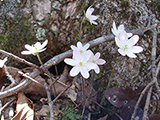
A Spring Beauty
Have you ever driven down the road on an early spring day just feeling some joy you can’t explain? Something inside is trying to burst forth, and holding it back is a chore. You sing with a song on the radio at the top of your lungs. The world around is full of warmth and coming alive!
Read More
A Prescription for Nature
As we head into late spring and march on toward summer, the weather is just getting better and better for venturing outside for some fresh air and exercise. Here at MyWoodlot, we’re celebrating all this healthy living with a month of new activities designed to help get you out in nature.
Read More
Overlooked and Underfoot: The Water Bar
Waterbars are simple, down-sloped berms of dirt dug into a trail. It might seem odd or even annoying to have bumps in your trail, but waterbars serve an important purpose: they divert water off the trail before it causes erosion.
Read More
How to Keep Your Arbor Day Tree Alive
April 29th is Arbor Day, and many of us will celebrate by planting a tree. But if you really want that tree to survive, just planting it won’t be enough. Like human babies, baby trees are fragile and benefit from some loving care. With that in mind, here are some tips for protecting your Arbor Day seedling so it grows into a big, healthy tree someday.
Read More
Grapevines: To Cut or Not to Cut?
As a rule of thumb, I don’t like email. But that rule doesn’t apply when I get forestry questions from woodland owners. I’ve even come to expect and look forward to emails from some landowners. Carrie Sears is one of these people.
Read More
Biocontrol of Emerald Ash Borer: Hope for the Future of Ash
Note from MyWoodlot editor Josh VanBrakle: The emerald ash borer is the most destructive forest pest we’ve seen in decades and threatens multiple species with extinction. But as doctoral student Michael Jones explains, an emerging technique called biocontrol offers hope that we can save millions of trees from dying.
Read More
Special Post: Reward for Large, Live, Healthy American Chestnuts in New York
A few weeks back we brought you a special blog post from Dr. William Powell of the State University of New York talking about his work to restore the American chestnut. We’re pleased today to do a follow-up special post with Allen Nichols, President of The American Chestnut Foundation of New York (TACFNY), discussing a way YOU can help bring back the American chestnut after its decimation by the invasive chestnut blight fungus.
Read More
Cedar Apple Rust: Complex, Colorful Fungus
This spring, you might be surprised to look at a juniper or cedar on your property and see bold, orange, spiky blobs on its branches. They’re not cones or fruits on the cedar. They’re actually one stage in the life of a complicated fungal disease: cedar apple rust.
Read More
Size Doesn't Matter
As a forester, it’s easy to fall into the trap of seeing myself as “the expert.” But I’ve found that when I interact with landowners, I usually learn as much from them as they learn from me.
This video features three woodland owners from Ohio sharing their insights, values, and reasons why they own woods. I can’t recommend it highly enough.
Read More
Your Input Requested!
Here at MyWoodlot, we strive to add a new activity every week, and we want those activities to be as helpful and interesting for you as possible. So while we’re happy to put up our own ideas, we’re always open to projects and resources you think would be useful to have on here.
Read More
Spring Is on the Way
Ok, we may not technically be there yet, but as we come into March, there’s no question that spring is on its way. The days are getting longer, the average temperature is rising, and I am slowly emerging from hibernation to get ready for one of the best times of year to be in the woods.
Read More
Winter Tracks
I do not enjoy winter. My apologies to skiers, snowshoers, and hockey fans, but I simply do not like it. I grew up in a place where 2 inches of snow led to closed schools, pandemonium on the roads, and a run on milk, bread, and eggs so fierce you’d swear everyone in town had a sudden hankering for French toast. Usually by December my wife and I are already saying, “We’re ready for spring.”
Read More
Tail-Less
I’m pretty sure my grandfather could speak Bird. When he wasn’t gardening or playing music, Grandpa loved to walk and whistle. With grandkids in tow, he would take the old railroad line or walk the apple orchards near his home and call the birds down to us.
Read More
Special Post: Genetically Engineered American Chestnut
Note from MyWoodlot editor Josh VanBrakle: The invasive fungus chestnut blight has decimated the American chestnut, once the most common hardwood tree east of the Mississippi River. But this ghost of the past may have a new future thanks to incredible work by folks like Dr. William Powell and the American Chestnut Foundation. I’m thrilled to share this article by Dr. Powell talking about the chestnut restoration work he and others are doing at the State University of New York.
Read More
Green Trees in Winter
I head up the trail to check out the giant eastern hemlock and eastern white pine in this woods on the West Branch Nature Preserve. There’s a certain feeling of awe and wonder, an amazing spaciousness, when you take in this stand of nearly 200-year-old trees.
Read More
Cross-Country Skiing in...New York City?
I survived the Great Snowy Blowy Blizzard of 2016!
Back in January, the Great Snowy Blowy Blizzard of 2016 (more formally known as Winter Storm Jonas) dumped more than two feet of snow on New York City. I passed the time by cooking soup, baking bread, and peeking out of my snow-encrusted windows to watch the gray fury blasting about in every direction.
Read More
To See More Nature, Write a Speedy Poem
Do you feel good when you spend time in nature? I do. Sometimes just walking around and looking at things is enough. Other times, I do a quick, simple activity to sharpen my senses, tickle my brain, and enhance my experience outdoors.
Read More
Product Review: Birding by Ear
Last spring I was hiking in the woods, and I had a realization. The spring migrants had arrived, and the forest was alive with birdsong. I knew there were many species around me, but to me, their songs just sounded like a jumble.
Read More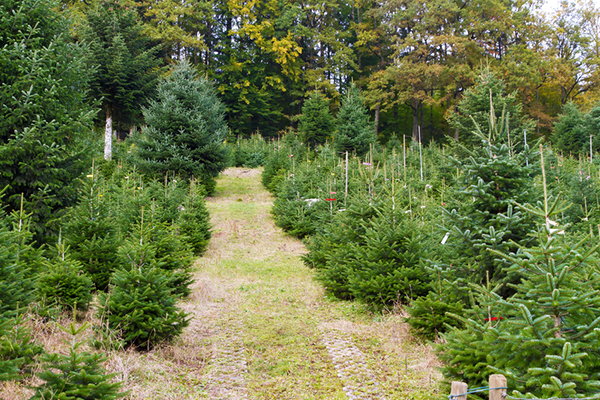
What Is So Amazing about a Real Christmas Tree?
Earlier this fall I was walking a woods when I rounded a bend and came upon a field of Christmas trees. I walked up to one, and it was a gem of a tree. It had a deep green color, a nice cone shape with soft needles, and a rich balsam smell. In short, it was the perfect Christmas tree.
Read More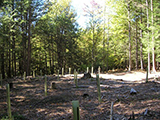
Management Assistance Program
Here at MyWoodlot, we try to focus on practical, inexpensive activities landowners like you can actually do.
Some activities, though, do cost money for supplies or professional help. Often those costs will be on you, but there are a few programs out there that can help offset certain woodlot expenses.
Read More
